Health Service of the Year
Annual Report and Quality Account 2019

Our purpose
To enrich diverse communities through quality health care and support services.
Our promise
To provide you with an outstanding customer experience through genuine relationships, positive outcomes and community presence.
Our values
We are MERRI : we Motivate, Engage, Respect, Respond and Innovate.
Connect with us
Merri-Health
@MerriHealth
goo.gl/gWrGqi
Merri Health
Acknowledgement
We acknowledge Aboriginal and Torres Strait Islander people as traditional custodians of the land and waters and acknowledge and pay respect to their Elders past and present.
We acknowledge the financial support received from the Victorian and Federal Governments in addition to several local government areas and revenue we generate though our other activities to support service delivery.

2 About Merri Health | Annual and Quality of Care report 2019
56 Safe and quality services
67 Continuity and better care
85 Board of Directors proceedings and financial report
2019 report
In late 2018, Merri Health was announced Premier’s Primary Health Service of the Year! Recognising Victoria’s leading healthcare providers, the award celebrates high quality care, innovation and the contribution the workforce makes in supporting the health of Victorians.

As a non-for-profit health provider, support for all Victorians with tailored solutions is at the forefront of our work. This year’s report is dedicated to this achievement and the work we provide in the community.

Accreditation
Merri Health is an accredited health service provider. This means we complete regular accreditation reviews by independent bodies to ensure that our policy, procedures and systems meet safety and quality requirements, and our services are safe and responsive.
Our services are accredited under Early Childhood Intervention Standards, Mental Health Service Accreditation, Quality Improvement Council, Human Services Standards, Community Care Common Standards, National Safety and Quality in Healthcare Standards — dental services, and Rainbow Tick Inclusive Practice Standards.

To learn more about accreditation, quality and safety, see page 63.

Annual and Quality of Care report 2019 | About Merri Health 3 5 Annual Report 25 Quality Account 27 Inclusive and responsive services 45 Partnering with consumers Merri Health creates healthy, connected
through local health services for people at every age and stage of life.
Contents
communities
We’re a not-for-profit community health organisation that has been part of your community for over 40 years.
Cover image from left: Carers Terry, Sue and Ayden. Find out how we support carers on page 73.
About Merri Health

4 About Merri Health | Annual and Quality of Care report 2019
About the report
Learn about our organisation, how it is structured, Board of Directors and governance, our services and financial reporting.
About the Annual Report and Quality Account
The first section of this report is our Annual Report. This section provides you with information about our organisation, how it is structured, Board of Directors and governance, our services and financial reporting.

The remainder of the document is our Quality Account. This report is broken up into four sections that highlights how we:
1. Provide inclusive and responsive services
2. Partner with consumers
3. Ensure safe and quality services
4. Provide continuity and better care
This report is an opportunity to provide insights about our services and organisation: our performance, actions and achievements. We also share client stories that are told with their permission, to show how our support is helping community.
How do we put this information together?
Many teams across the organisation were involved in the preparation of this report. When deciding what should be included, we are wguided by statutory requirements and Safer Care Victoria for open and transparent reporting.
We review this report with lots of people: our Board, leadership team, staff, clients and Community Engagement board sub-committee. We do this to ensure the information is correct easy to understand, and informative.
Where to find this report
This report can be found at each of our sites. See page 90 to find an office location near you.
The report is also available on our website, merrihealth.org.au
Annual and Quality of Care report 2019 | About Merri Health 5
Chair’s report
Reflection and growth
Quality improvement
As an active participant on the Community Health Taskforce we have completed our review and the finalised report was delivered to Government in July 2019. This sees us taking a stand for our vulnerable communities, ensuring equitable access of healthcare and addressing those falling through the gaps by our current system.
The Board has made an investment into enhancing the standard of our governance, reporting and transparency to the community we serve. We received a bronze award for our 2018 Annual Report from the Australasian Reporting Awards, and as part of our commitment to continuous improvement, have made several changes throughout this year’s report. We hope the changes provide a clear, concise and informative report on what has been achieved over the year and our areas of focus going forward.
Nearly 60% of the Board membership is a member of the Australian Institute of Company Directors (AICD). We undertook a self-assessment against the new 2nd Edition AICD Not-For-Profit Governance Principles, alongside our two-yearly governance evaluation. 100% participation in the governance evaluation reported a valuable 87.5% maturity rating against all the core competencies. Our annual strategic review saw us undertaking an in-depth analysis on the changing external environment, identifying our key challenges and making firm decisions as to how Merri will respond. The review keeps us on track as an organisation positioned for growth, and we are pleased to be able to report after prudent financial management of an annual budget of $39 million, an increase of over $2 million over the last year, continuing the year-on-year growth trend in the past six years.
The Board of Directors alongside the Merri team made significant investment this year to improve quality, safety, clinical governance and risk management across the organisation. The newly developed Better Care and Services Framework was launched in early 2019 contributing to increased transparency, accountability and reporting and driving a culture of good governance. The framework has responded to and drawn on the Safer Care Victoria (Department of Health and Human Services) legislation and policy, and is designed to ensure all people and consumers understand how we achieve high quality and safe healthcare, and everyone has a part in making this happen.
Looking forward, we look to continuing to provide an outstanding customer experience to every person, every time they engage with us.
Carlo Carli Chairperson

6 About Merri Health | Annual and Quality of Care report 2019
Merri Health (Merri) continues its advocacy for the community health platform as a pivotal component in the broader healthcare system for Victorians.
CEO’s report
with new signage, building modifications, increasing personal security awareness and rolling out additional training for our staff. We further prioritised our proactive health and safety management with the implementation of our comprehensive Mental Health and Wellness Framework. Addressing safety issues across the organisation saw us achieve a 76% positive employee rating which we are hoping to improve over the course of the next year.
Over the past 12 months we have continued to grow our services with two new sites in Craigieburn and Preston South, to improve access to our services particularly for clients transitioning to the National Disability Insurance Scheme. These strategically placed facilities have helped reduce employee travel time and improve service access for clients.
Culture
We undertook our sixth staff climate survey achieving the highest participation rate in eight years with an 88% response rate. We also achieved our best result from a culture perspective, with the overall organisation highly engaged in a ‘culture of success’. Our culture is defined by our staff’s positivity, strong sense of achievement, tackling problems proactively and having a ‘can do’ mentality. The culture of our workforce is paramount, having the resilience and agility as we work our way through the significant ongoing policy reform environment that is impacting the entire service sector.
Staff safety
Over the course of the year we saw an unacceptable increase in exposure to occupational aggression and violence at several of our sites. We rapidly responded
Responsive care
The Merri Health team is proud to have significantly improved upon and met our promise in providing an outstanding customer experience every time with 97% of our clients rating their care received as positive, and 91% of clients stating their care plan was useful2
Continuing our commitment in providing responsive care, we introduced electronic feedback kiosks at three of our key sites to collect and respond to real-time feedback and complaints, providing clients with another option to share their thoughts in multiple languages. Since launching in May 2019, we have received 1,188 feedback entries with 93% giving a score of 100% satisfaction.
Achievements
At the beginning of 2019 we achieved our gender equality strategy goal, with Merri awarded Employer of Choice for Gender Equality citation from the Workplace Gender Equality Agency. We are one of only seven organisations in the health/ social assistance industry to achieve this citation. Our continuous work has seen significant cultural shift and changing attitudes with 100% of employees stating Merri does not tolerate gender-based harassment, 97% stating their manager
genuinely supports equality between genders, and 88% reporting they have the flexibility to manage their work and other commitments.
In late 2018 we were also delighted to receive the Premier’s Award for Primary Health Service of the Year. The award showcased Merri delivering alternative community-based models of care, taking our services beyond traditional settings and extending ourselves beyond our catchment to where care is needed the most.
Many of the innovative approaches we have adopted wouldn’t have been possible without fostering collaborative practices with hospitals. The ability to deliver the wide range of innovative services we provide relies on trusted partnerships and I’d like to thank our 65+ partners for the collective impact we are able to deliver working together. Of note is our partnership with the National Disability Insurance Agency, as we continue to support the NDIS transition as an early childhood partner in regional Victoria. Our role as auspice for the northern and western metropolitan elder abuse prevention pilots sees us connecting with more than 85 organisations to work together on this important initiative. I would also like to acknowledge the support of the Victorian and Commonwealth Governments in funding the delivery of programs and services that build healthy and connected communities.
After 8+ years at Merri, this is my final year. During my time, in partnership with the team at Merri, we’ve been able to achieve some great outcomes for the communities we support and I’m incredibly grateful for the journey.
Nigel Fidgeon Chief Executive

Annual and Quality of Care report 2019 | About Merri Health 7
Merri Health (Merri) celebrates another successful year with our continued growth delivering 229,156 service instances in 2018/191 , to meet the demand for place-based health services for the many communities we serve.
1 Data from our two main data systems — there are many other client systems that are not included in this total. 2 Merri Health results from the Victorian Healthcare Experience Survey 2018/19.
Our reach
North and West metropolitan region
The North and West metropolitan region covers 2,981 square kilometres and 14 local government areas. The region has experienced strong population growth and is continually growing. In the last four years, the resident population has grown by over 150,000 people, and is expected to reach more than 2 million by 2020. It has the most diverse population in the state.
Diversity
With an estimated population of 1.67 million, at least 33% were born overseas. Common countries of birth outside of Australia include Italy, India, Pakistan, Lebanon and Nepal.
Darebin, Wyndham and Hume have the highest populations of Aboriginal and/or Torres Strait Islander peoples.
Health
Obesity is a growing risk in the Northern Metropolitan Melbourne area. The areas with the highest obesity rates include Hume and Wyndham, with Moonee Valley currently on the brink.
Young females between 16–34 years old have a higher rate of mental health disorders than males within the same age range.
Darebin have reported a higher rate of hospital admissions due to mental health illnesses, including schizophrenia in Aboriginal persons.
In terms of chronic illness, cancer is affecting a large amount of the population in the Darebin, Hume and Moonee Valley areas. Rates of asthma are also higher across this region than the rest of Victoria.
Smoking is more common in Darebin and Hume, with young people taking up smoking at high rates in Yarra, Moonee Valley and Moreland. Lung cancer is at its highest in Darebin.
Languages spoken
17% of older people speak a language other than English at home with the most being in Darebin and Moreland. Nearly 30% of residents were born in non-English speaking countries and 48% of the population only speak English at home. Besides English, Italian is the most spoken language at 8.6% followed by Arabic, Urdu, Greek and Turkish.
Age groups
The Northern and Western Metropolitan region has experienced strong population growth since 2002 and growth is projected to continue at a similar rate through to 2022.
According to the Australian Bureau of Statistics, the median age in the region is currently 35. The majority of people identify female which is just 1% higher than males. Less than 64% of the population is under the age of 45; most of these people are aged 30–34.
Children up to the age of 10 make up 14% of the population.
The North Western region of Victoria’s population is younger than the Victorian average. Hume and Brimbank are home to a growing number of young families.
The population of older people over the age of 65 is estimated to increase by 55% by 2026. Of those aged 65 and over, 17% speak another language at home.
people call this region home
1/3
1.67m were born overseas
8 About Merri Health | Annual and Quality of Care report 2019
Hume Moreland Darebin Moonee Valley Melbourne arra Banyule
Nillumbik Whittlesea Y
Disadvantage
Aboriginal and/or Torres Strait Islander peoples have a lower individual and household weekly income than nonAboriginal people. Brimbank has the lowest median income in non-Aboriginal communities and the second lowest income with Aboriginal communities. Brimbank and Hume in particular have scored a high socio-economic disadvantage rate. Children in the outerwest part of Melbourne experience higher rates of vulnerability due to being raised in high socio-economic disadvantage.
According to the North Western Metropolitan Primary Health Network’s Needs and Assessment report, Hume is amongst the regions with the highest disadvantage rate, scoring 947 below the 1000 relatively disadvantaged marking point.
85%
Percentage of people aged 65 and over that have a chronic illness
64%
Percentage of the population that is under 45 years
Hume region
The Hume region covers north eastern Victoria and the Goulburn Valley and includes 12 Local Government Areas. Hume has one of Victoria’s fastest growing populations. Currently, there are 224,394 people living in this region.
Diversity
Aboriginal and/or Torres Strait Islander peoples make up a small percentage of this population at 0.7%. The most common ancestry is English at 15.3%, followed by Italian at 6.7%, Turkish at 6.7% and Irish at 4.8%.
Health
Residents of Hume have a wellbeing average score of 75.9 out of 100. While it’s not close to the Victorian average of 77.3, 6.3% of the Hume population need support with everyday activities.
Age groups
Hume’s population is largely made up of younger people under 35, with the largest group between 25–35 years old. There is also a high number of children aged 0–10.
On the SEIFA Index of Disadvantage, Attwood has the lowest level of disadvantage in the Hume region.
Resources
multicultural.vic.gov.au/index.php/regional-advisory-councils/regions/north-west-metropolitan nwmphn.org.au/wp-content/uploads/2018/04/ NWMPHN-Aboriginal-Torres-Strait-Islander-Area-Profile-2018.pdf
nwmphn.org.au/wp-content/uploads/2018/04/ NWMPHN-Chronic-Disease-Area-Profile-2018.pdf
nwmphn.org.au/wp-content/uploads/2019/04/ NWMPHN-Health-Needs-Assessment-2018.pdf
nwmphn.org.au/wp-content/uploads/2019/01/ NWMPHN-Mental-Health-Area-Profile-2019.pdf abs.gov.au/
docs2.health.vic.gov.au/docs/doc/F467C58FA0024D52CA25785200074C72/$FILE/NorthWestRegion_external.pdf
vichealth.vic.gov.au/-/media/VHIndicators/ Interface/Vic161_Hume_indicator_v5.pdf?la=en&hash=E23BBA41E740E3D95FD6FD5C8A3002F034203ABE
Annual and Quality of Care report 2019 | About Merri Health 9
Hume region
Our profile
Merri Health is one of Victoria’s largest non-for-profit community health providers, with a range of health and wellbeing services to support people at every age and stage of life.
We support our clients by working together: we find out what is important to them, and link them with services and programs that support their health, wellbeing and social goals.
Our 386 staff and 99 volunteers focus on improving health outcomes particularly for disadvantaged and vulnerable groups, young and older people, people with disabilities, from culturally diverse
backgrounds, with complex health needs, and with various gender identities and sexual orientations.
Over the past year, data from our two main systems shows we’ve provided 229,156* service instances at our 11 locations and beyond. We currently provide 60+ diverse services to support better health across our community.
Service divisions
We have three divisions; Aged and Primary Care, Healthy Communities and Family and Community, in addition to three service support divisions; People and Communications, Infrastructure and Development, and Finance.
10 About Merri Health | Annual and Quality of Care report 2019
*There are many other client systems that are not included in this total.
BOARD OF DIRECTORS Chief Executive Officer Nigel Fidgeon Executive Assistant Joan Wilkinson Executive Assistant Lisa Gallo (LVE) Belinda Rutledge Executive Assistant Joan Wilkinson Counselling and Support services Victims Assistance Program Ovens Murray Early Childhood Early Intervention Children and Family Finance Company Secretary Facilities Information Technology Information Management CarerLinks North Community Wellbeing National Disability Insurance Scheme services Human Resources Marketing and Communications Community Engagement Quality Customer Experience General Manager Family and Community Tassia Michaleas General Manager Healthy Communities Maryanne Tadic Chief Financial Officer Gavin Thompson General Manager Infrastructure and Development Phillip Harris General Manager People and Communications Nessá Pastoors General Manager Aged and Primary Care Dr. Antoinette Mertins Dental services Prevention and Complex Care Aged and Primary Care Business Partner Aged Care
We’re Employer of Choice for Gender Equality!
We are one of seven organisations in the health/social assistance industry granted the citation by the Workplace Gender Equality Agency for 2018/19.
Our services
We provide many short-term activities, programs and groups to meet the changing needs of our communities, and educational opportunities for a healthy body and mind.
Aged services
For anyone over 65 years, or 50 years for Aboriginal and/or Torres Strait Islander peoples, our aged care services support choice, connection and independence. We provide carer support, short-term education and exercise groups, health services like occupational therapy and physiotherapy, respite for carers or frail older people who live at home, social groups and support at home via Home Care Packages.
Carer support
Flexible and individualised support, education and training for carers of all ages.
Child and family services
Promoting happy, healthy children and strong families with services like counselling, support for children with a disability, education, family services, family violence and support for victims of crime.
Chronic conditions

Treatment, education and support to help you live well with your chronic condition.
Dental services
Promoting good, oral health through education, community screenings and general dental support.
Disability services
Supporting people with a disability with flexible health services and greater choices. We can help with National Disability Insurance Scheme plans, carer support, help for children with a disability and their family, education, health services like speech pathology, social groups and support at home.
Health and wellness services
Supporting you to stay healthy and well with short-term education and exercise groups such as knee and hip osteoarthritis management and living well with diabetes, health services like physiotherapy, occupational therapy and podiatry, support to stop smoking and asthma education.
Mental health services
Supporting recovery, better health and wellbeing through local group activities, drop-in support, counselling, alcohol and drug support for LGBTIQA+ people, and support for victims of crime and people living in Supported Residential Services.
Young adult services
Helping put young adults on track for a healthy and fulfilling life with carer support, counselling, education, one-on-one help, support for young people that identify LGBTIQA+, group activities and support for victims of crime.
National Disability Insurance Scheme
The National Disability Insurance Scheme known as the NDIS is a national government initiative for people living with a permanent and significant disability. Merri provides NDIS support for children with a disability and their family through MerriKids, and we also offer support coordination, health services, activity groups and mental health support.
Community wellbeing
We respond to the changing health needs of our community. We help shape healthy schools, support sport participation for refugee and newly arrived people, address poor school readiness, support newly arrived women through an Urdu-speaking women’s group, support for LGBTIQA+ people and much more.
Annual and Quality of Care report 2019 | About Merri Health 11
Above: Staff member Christine from our stop smoking program.
Board of Directors
Our Board of Directors manage the business of Merri Health, providing a governing approach and expert advice.
Carlo Carli Chair
Carlo is a Moreland resident and has been involved in public policy for most of his professional career. Carlo has been a public advocate for access and equity, multiculturalism and broader human rights issues and was a Member of Parliament for Brunswick for 16 years. He is fluent in English, Italian and Spanish and has a good command of the French language.
Julie is the manager of the clinical training unit at Dental Health Services Victoria, where she has been since May 2012.
Julie has a background in education and public health and is a Director of a small business called Incompany, Women in Trades. Julie holds a Masters in Public Health (Women’s Health), Graduate Diploma in Education and Certificate 1V in Training and Assessment, Bachelor of Arts and a Graduate Diploma in Frontline Management. She has trained as a mediator.
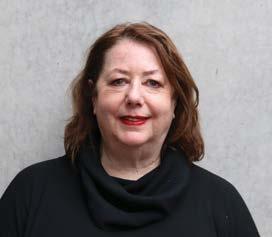
Darryl Annett Board member
Darryl has lived in the northern suburbs of Melbourne for over 22 years and has been actively involved in the community through local school groups and sports clubs.
Darryl is a lawyer who has 30 years’ experience, with a legal career in the public sector and private practice, in criminal defence advocacy and criminal prosecution work. He held a four-year appointment as Deputy Chair of the Business Licensing Authority and is currently the coordinator of the Salvation Army’s Urban Justice Centre.
Caputo Board member
Joe lives and is active in Melbourne’s northern suburbs and has been involved in advocacy for the rights of minorities throughout his adult life. During 1970–80, he was involved in promoting the rights of migrant workers, and was a member of the Victorian Multicultural Commission from 2001–2011.


Joe has served as Councillor and Mayor in the former City of Brunswick and as Councillor and Mayor in the City of Moreland. Joe is a founding member of the Moreland/ Hume/Aileu (Timor Leste) Friendship Committee, is an expert in industrial relations and holds a Master of Business from RMIT.

12 About Merri Health | Annual and Quality of Care report 2019
Joseph
Julie McCormack Deputy chair
Michael Malakonas Board member
Michael is a strategic Executive with more than 28 years’ experience in finance, accounting, operations, enterprise risk strategy, governance and general management.
Michael has worked for large multi-national corporations, and is currently the Chief Executive Officer of Zeal Solutions Pty Ltd and a non-executive Director, chairing the Finance and Audit Risk Management Committee at Merri Health.
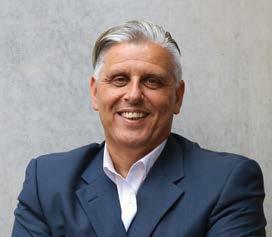
Katerina Angelopoulos Board member
Katerina is an experienced Director with a background in corporate management, health issues planning, human resources and community engagement. In 2008 Katerina was appointed to the University of Notre Dame School of Medicine Advisory Committee, and is actively engaged in governance activities with a number of Melbourne-based organisations.
Katerina has lived in the Brunswick and Coburg areas for 45 years. For 25 of these years she has been involved in community service, including the local YMCA, Ethnic Communities Council and councillor with Moreland City Council.
Marleine Raffoul Board member
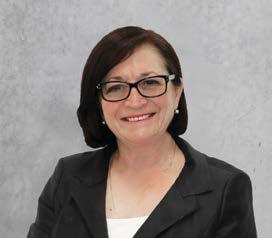

Marleine has been a resident of the City of Moreland for 13 years and has been involved in various committees within the area. Marleine has been educated in three languages and her knowledge extends to teaching and business expertise. She is passionate and committed to improving health services to the multicultural community of Moreland, and looks forward to extending her expertise to its residents.
Benjamin Maxfield Board member
Benjamin Maxfield is the Government Relations adviser for Victoria’s $11 billion Metro Tunnel project. Prior to joining the metro tunnel project Benjamin worked as a senior adviser in both the Gillard Government and then the Shorten Opposition.
Benjamin has a keen interest in defence and foreign policy. In recent times Benjamin has worked with Social Democratic Parties and organisations around the world to improve their electoral standing and human rights record.
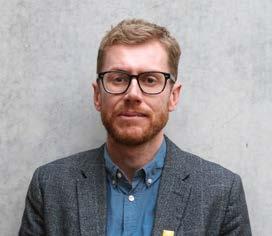
Ann Taylor Board member
Ann is an active member of the community and has been a resident of Moreland for more than 40 years.
With an extensive background in public education, Ann has worked as a teacher, policy officer for the Education Department, and assistant principal and deputy president of the Australian Education Union. Now retired, Ann hopes to continue to improve the lives of community members through her work at Merri Health.
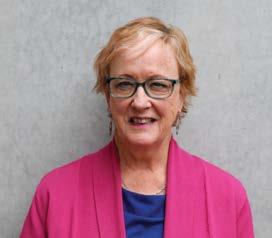
Annual and Quality of Care report 2019 | About Merri Health 13
See page 84 for governance proceedings.
Executive Leadership Team
The Executive Leadership Team lead the staff of Merri Health to achieve common goals that are in line with our vision and purpose.
Nigel Fidgeon Chief Executive Officer

MHA, BN, GAICD, FCNA, FCHSM
Nigel has extensive executive management and CEO experience in leading and managing complex organisations across the public and private health sector, at both strategic and operational levels in acute and non acute settings.
Nigel holds a Master of Health Administration, and a Bachelor of Science (Nursing). He is a graduate and member of the Australian Institute of Company Directors, a Fellow of the Australasian College of Health Service Management, a Fellow of the College of Nursing Australia, and a Wharton Fellow.
Dr. Antoinette Mertins General Manager, Aged and Primary Care

DrPH, PDipHRM, BBSc, GAICD, AFCHSE
Antoinette has extensive experience working in the public and not-for-profit sector across a diverse range of organisations. Antoinette has strong skills in driving workforce reform, development of innovative community-based models of care and developing partnerships across sectors.
Antoinette holds a Doctor of Public Health degree, a Post Graduate Diploma in Health Research Methodology and a Bachelor of Behavioural Sciences (Psychology). She is an Associate Fellow of the Australian College of Health Service Management, and graduate and member of the Australian Institute of Company Directors.
Tassia Michaleas General Manager, Family and Community Support Services
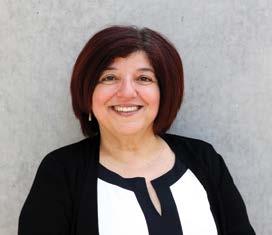
BEC, BSW, MBA, AFCHSM, GAICD
Tassia has extensive experience in the not-for profit and community sector and commenced her career in community health in 1996. Tassia has experience working across leaderships and operational areas and takes a pro-active approach in developing and delivering innovative services and programs. Tassia has strong skills in advocacy, streamlining of systems and processes, effective engagement of stakeholders and developing partnerships. Tassia holds Bachelor of Economics, a Bachelor of Social Work and a Master of Business Administration. She is an Associate Fellow of the Australian College of Health Service Management and a Graduate of the Australian Institute of Company Directors.
14 About Merri Health | Annual and Quality of Care report 2019
Gavin Thompson Chief Financial Officer

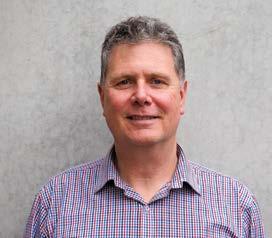
B.Bus (Acc), GAICD, CPA
Gavin has held a range of senior finance positions across not-for-profit, corporate and international sectors. He has worked in financial management in the homelessness and community service sector as well as roles in a variety of industries such as aerospace, investment banking, software development, retail banking, hotels and trustee services. Gavin has skills in providing strong financial stewardship to organisations while maintaining a co-operative and helpful approach to aid service delivery programs. Gavin holds a Bachelor of Business, is a Graduate of the Australian Institute of Company Directors and is a Certified Practising Accountant (CPA).
Nessá Pastoors General Manager, People and Communications

BCCJ, MER, EMBA
Nessá Pastoors has worked in the non-for-profit sector for 14 years and brings a wealth of knowledge with 12 years of leadership and management experience in employment relations, project management and governance. With a proven track record of building workforce capacity and contributing to organisational growth, Nessá has been instrumental in driving organisational capacity and cultural change across various roles in the non-for-profit sector. Nessá holds a Bachelor of Criminology and Criminal Justice, Masters of Employment Relations, Certificate in Business and Human Resources Management, and an Executive Masters of Business Administration.
Phillip Harris General Manager, Infrastructure and Development MBA,
GAICD
Phill has held senior executive roles within the information technology and infrastructure management portfolios spanning a number of industries including education, government, telecommunications and media, most recently within the health sector. Phill’s experience includes strategic planning, business process improvement, project management, procurement and facilities management. Phill has a Master of Business Administration, is a Graduate of the Australian Institute of Company Directors and has a Graduate Certificate in Leadership in Education and Training, as well as ITIL Service Management and Prince2 Project Management qualifications.
Maryanne Tadic General Manager, Healthy Communities

MPH, BHSc, AFCHSM, MAICD
Maryanne has over 15 years of experience working in the community health sector within both leadership and operational contexts. Maryanne has a background in population health and has experience in leading a number of community-based research projects. Maryanne holds a Master of Public Health degree (Health Services Management) and a Bachelor of Health Sciences (Health Promotion). She is an Associate Fellow of the Australian College of Health Service Management and a member of the Australian Institute of Company Directors.
Annual and Quality of Care report 2019 | About Merri Health 15
Our workforce
As one of Victoria’s largest community health providers, Merri Health continues on the journey to establishing our footprint as an inclusive employer of choice.

In 2019, we were one of seven organisations in the health/social assistance industry granted Employer of Choice for Gender Equality citation by the Workplace Gender Equality Agency for 2018/19.
Situated in one of Victoria’s most diverse catchments, we recruit, develop and retain a competent, committed and diverse workforce that provide high quality services to our clients, their families and the wider community.
We value the diversity of skills and professional experience that each team member brings to our organisation. Ongoing support is provided to our employees through education, training, regular appraisals, clinical supervision, good employment provisions and flexible working options to ensure all employees are given every opportunity to succeed in their roles. Our success is very much attributed to the performance and contributions of all our employees.
40
Number of online and face-to-face training offered to staff for continuous development
16 About Merri Health | Annual and Quality of Care report 2019
Employment type Gender Fulltime Parttime Casual Gender diverse 0 3 0 Female 117 166 41 Male 26 27 6 Total 143 196 47 Workforce profile Gender No. of employees % of total workforce Gender diverse 3 1% Female 324 84% Male 59 15% Total 386 100%
Above: (From left) Merri staff supports client.
Education and training
Merri Health is committed to a culture where ongoing learning is valued and supported for continuous improvement in service delivery. The development of our people is a vital investment with benefits to many; the organisation, employees, clients and broader community. Achievements in the continuous development and support of our workforce include:
• individual learning plans that detail personal and professional development. Learn more under ‘performance review’ to the right.
• workplace gender equality strategy — a phased, whole-of-organisation approach to the primary prevention of violence against women
• investing in personal safety and security of our team, by training 120 staff to help them appropriately manage clients with challenging behaviours and implement de-escalating measures
• access to 40 online and face-to-face education and training sessions for staff. Both learning options are offered as we recognise that everyone has different learning preferences
• consistently high results in staff satisfaction surveys with an 88% response rate: 72% of staff agree we are able to meet client expectations on delivering exceptional service — 19% above the health and community services benchmark.
Performance review
Merri Health’s success is underpinned by a highly competent workforce that can respond and adapt to an evolving and complex operating environment.
Our Individual Performance Review framework outlines our commitment to continuous development for our staff. The framework is designed to maximise individual accountability, enable open and transparent communication and clarification on performance, and realign direction. The tool supports managers to identify career aspirations, future leaders and succession planning opportunities. Every year, staff complete their Individual Performance Review using values-based reflective practices, with a 92% completion rate in 2018/19.
Inclusive workplace
Safe, respectful and an inclusive environment and practices for clients, visitors, partners and staff are key priorities at Merri Health. The diversity of our staff, clients and community is the driving force behind this.
Education and training offered by Merri that addresses systemic discrimination which affects people’s health and wellbeing include:
• inclusive practice training focusing on cultural and linguistic diverse communities
• LGBTIQA+ inclusive practice training
• cultural appreciation training focusing on Aboriginal and Torres Strait Islander peoples.
In addition, in 2019 we developed our own face-to-face training led by LGBTIQA+ staff, to address the unique needs of our organisation and community.
Supporting inclusive employment, in 2018/19 our Healthy Communities team created four new roles that targeted people from communities often experiencing higher rates of unemployment, such as young people, Aboriginal and Torres Strait Islander people, people from cultural and linguistic diverse backgrounds, and the LGBTIQA+ community.
Annual and Quality of Care report 2019 | About Merri Health 17
Completion rate of Individual Performance Reviews for continuous development of staff
92%
Number of roles introduced in 2018/19 targeting people from communities often experiencing higher rates of unemployment
4
Workforce highlights
1. We co-designed a new appreciation, reward and recognition framework with our staff. Co-design is a collaborative process where you work in partnership with the end user to find better solutions
2. We undertook an external remuneration benchmarking process with Mercer to review our leadership market rates and support retention and attraction
3. We introduced a new communications module called ‘Merri Talks’ that offers different learning options for staff when there are changes to human resources practices or new items are introduced
4. Our human resources and volunteers officer Adam Roden was awarded a Rising Star Award by the Australian HR Institute, recognising his efforts towards establishing a supportive working environment via our Mental Health and Wellness framework
5. We launched our Better Care and Services framework to improve transparency, accountability and reporting, and drive a culture of good governance
6. We successfully negotiated a sector first Merri Health industrial agreement, offering improved and unique employment options for staff
7. We were the only community health provider in 2018/19 in Australia to receive an Employer of Choice for Gender Equality citation by the Workplace Gender Equality Agency
8. We developed our first in-house LGBTIQA+ training led by LGBTIQA+ identifying staff.
Occupational health and safety
1. A full review of our first aid management practices to ensure best practice and compliance

2. Introduction of VHIMS Central: a new reporting system replacing the previous VHIMS2 that captures occupational health and safety, hazards, and clinical incident data as well as compliment and complaint feedback
3. Introduction of a Mental Health and Wellness framework; a whole of organisation approach to the health and wellbeing of staff and volunteers through programs, initiatives, resources and support
4. Redesign of our Incident Management framework, separating clinical and occupational health and safety.
18 About Merri Health | Annual and Quality of Care report 2019
Above: Our Social Support Programs offer support for people 65 and over via fun and engaging groups.
Merri Health climate survey
What do our staff think about working at Merri Health?
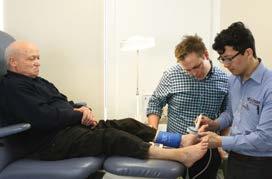
Every 18 months, Merri Health staff are offered the opportunity to share their experience of working at Merri via a climate survey. We offer this survey so we can respond to the needs of our staff and continually work towards Merri being a great place to work.
To ensure the survey is anonymous and confidential, we engage Best Practice Australia, an independent organisation that conducts the survey on our behalf. The survey is open for a period of two weeks and once completed, results are shared with teams who use this to develop action plans to improve our workplace and practices.
In 2019, we completed our sixth climate survey.
Overall results
• For the first time, Merri Health is in ‘culture of success’ that is defined as having a large number of staff that are optimistic about the organisation’s future, and a sense that things are getting better all the time. This means we have had a 10.9% increase in engagement over the last five years
• We achieved our highest participation rate (ever!) of 88%
• We are benchmarking above the sector norm across 90 areas
• We are meeting industry benchmarks on 12 areas.
Where we rated well
Our results for the following areas were positive:
• Reward and recognition: 10% increase in satisfaction from staff reporting they are rewarded and recognised for outstanding performance
• Appreciation: 13% increase in satisfaction from staff (76%) stating that our leaders provide them with appreciation for good performance
• Leadership: more than 80% of staff reported our leadership to be responsive, accessible, visible, competent, professional, trustworthy and supportive
• Good place to work: our Net Promoter Score for recommending Merri as a good place to work was +29.8. See next page
• Merri is the best choice for services for a friend/family: our Net Promoter Score was +48.3.
Need for improvement
Our results for the following areas were low and will be addressed:
• Remuneration: 36% said that they did not feel that Merri offers ‘a fair day’s pay for a fair day’s work’
• Career: only 39% agree that Merri offers good development and career opportunities. This result is lower than the previous year.
We are addressing these concerns by:
• introducing a new industrial relations strategy — we have already started this work by investigating remuneration benchmarks with the help of Mercer. See ‘Workforce highlights’ for more information
• supporting management and staff to help with strategies on having open and transparent conversation about career and training opportunities
• highlighting career development opportunities in staff newsletters.
Annual and Quality of Care report 2019 | About Merri Health 19
Results Reward and recognition Remuneration
Merri Health is now in a ‘Culture of Success’!
Above: Podiatry student in training at a Merri Health facility.
How to read Net Promoter Scores
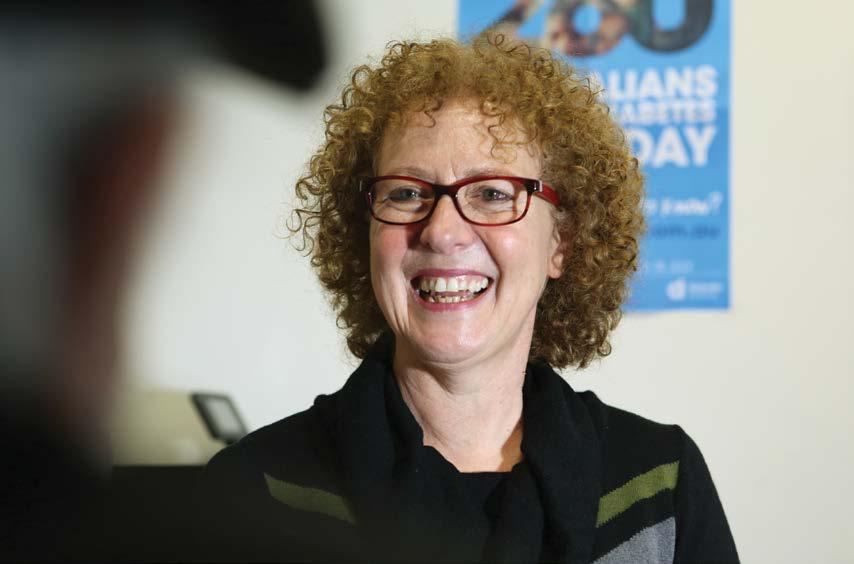
20 About Merri Health | Annual and Quality of Care report 2019
Net Promoter Score = % Promoters - % Detractors
example:
Net Promoter Score for
is +28.0 which
it
are more ‘promoters’
this statement.
would recommend Merri Health to a family or friend % Promoters - % Detractors 49.4% 21.4% = +28.0
For
Our
this example
is positive as
means there
that agree with
I
Above: Staff member Christine.
Our volunteers
Volunteers provide support in many ways and are an extension of our workforce.
We currently have 99 active volunteers with most offering support across mental health, disability, CarerLinks North (carer support program), and social support. We are also seeing a growing number of volunteers offer support with administration, supporting our team to improve and enhance clients’ experience.
Most of our volunteers are motivated to give back to community. Some also want to gain experience in their studied field to help with employment opportunities. This year, we turned two volunteers into paid staff.
Trends
Currently, we are experiencing a trend of long-term volunteers that stay with us for 18 months or longer. This is higher than the national trend where volunteers are staying on board for 12 months or less.
In the 2018/19 period, episodic volunteering started to become a focus and is becoming a preferred method.
Growth
To support growth, we implemented Merri Volunteering Open Days in early 2019, which encourages potential volunteers to learn about Merri and speak to existing volunteers about their experiences. The first session resulted in an additional eight volunteers joining our organisation.

Changes
Since completing our engagement period with The Community Grocer Fawkner; a project that saw us support the social enterprise to establish a low cost grocer in Fawkner, we have seen a decrease in the number of volunteers. The number of active volunteers also continues to change and is impacted by many factors such as lifestyle changes and family commitments.
Education and training
Supporting our volunteers with education and training opportunities is important to ensure safe and responsive support. It also allows us to give back to those that volunteer their time.
All volunteers are offered the same education and training opportunities as Merri staff, in addition to extra courses run by local councils and community houses. Supporting volunteers to maximise their time, we also improved our online Learning Management System, which volunteers are able to access from their personal computer: they no longer need to come in to a Merri site to access the portal.
Awards and celebrations
1. Fawkner Friendship Group which is run by Merri volunteers was a finalist in the Victorian Health Minister Awards 2019 for supporting diversity
2. Sharon Gunn was a finalist in the Victorian Health Minister Awards 2019 for improving public healthcare
3. Deb Velente who volunteers with our carer support program and started the Carer Chorus, was named Volunteer Champion by Whittlesea Council in 2019
4. All volunteers were acknowledged and received a certificate of appreciation as part of our annual volunteer appreciation function.
Annual and Quality of Care report 2019 | About Merri Health 21
Above: Merri volunteers with Adam (far right), human resources and volunteer officer.
Organisational planning
Strategic Directions 2018–2020
Our strategic directions provides a framework for our direction over the next two years, detailing our commitment to community, service streams, priorities including core service offerings and growth, the results we’re looking to achieve and our financial principles. You can find out more about our directions on our website, under About us
Diversity plan
Diversity is a defining characteristic of the area we serve. Our diversity plan sets the overall direction and goals for our organisation, in relation to diversity planning and practices for groups that are more likely to experience disadvantage.
The plan focuses on five key groups:
1. Aboriginal and Torres Strait Islander peoples
2. culturally and linguistically diverse communities
3. people with dementia
4. people experiencing financial disadvantage
5. LGBTIQA+ communities.
The plan is reviewed quarterly with updates on our progress provided to our funders.
Gender equity plan
Gender equality at Merri Health is a phased, whole-of-organisation approach to the primary prevention of violence against women. The project looks to prevent violence against women before it happens. We do this by building organisational capacity to embed gender equality across all of our policies and practices.
Our family violence and gender equality committee is made up of representatives from across different teams at Merri Health that monitor implementation and outcomes from our gender equality strategy. The committee also provide recommendations and direction for our application to become an employer of choice for gender equality.
Reconciliation Action Plan


Merri Health has a vision for reconciliation, where the wellbeing of local Aboriginal and Torres Strait Islander people will be restored through respect, equity and recognition. We support this vision through our Reconciliation Action Plan (RAP).
Learn more about the plan, achievements and future direction on pages 27–31.
Marketing and communications plan
Marketing and communications is important as it sets out how we will provide information to our communities and what marketing is needed to ensure that people are kept informed about how we can support them.
Our plan details how we will communicate with our clients, what methods we will use and campaigns that we will run. It sits alongside and complements our digital plan, which details strategies for communicating with our community in digital format.
Community Relationships Framework
Merri Health has a long-standing commitment to consumer, carer and community participation and engagement. Our Community Relationships Framework details our commitment to support consumers, carers and community members to improve health outcomes.
22 About Merri Health | Annual and Quality of Care report 2019
Above: Speak Up, Speak Up participants at a Smoking Ceremony.
Above: Students take part in our Speak Up, Speak Out program.
Awards and achievements
Key achievements over 2018–19 include:
• Premier’s Primary Health Service of the Year 2018
• one of only seven health services nationally awarded Employer of Choice for Gender Equality citation from the Workplace Gender Equality Agency
• Employer of Choice finalists for the Australia HR Awards 2018, recognising our inclusive and progressive practices
• Leading Age Services Australia Innovation Award 2018, for alternative support models for carers
• first provider selected to trial Family Foundations in Australia, an innovative approach to addressing family breakdown
• introducing Family Violence Support Service for young people and their families attending Melbourne Children’s Court
• Dental Health Services Victoria finalists 2018 for Public Dental Clinic of the Year, and Project of the Year for our Little Smiles program — supporting vulnerable children in Moreland to develop good oral health habits for life
• Third Sector Awards finalists 2018 for Chief Executive Officer of the Year (Nigel Fidgeon), and Marketing/ Campaign Manager of the Year (Viviana Rosas)
• Australasian Reporting Awards 2019 bronze award recipient, acknowledging good, honest and transparent communication in our annual report.

Annual and Quality of Care report 2019 | About Merri Health 23
Above: Merri Health team accept Premier’s Primary Health Service of the Year 2018 award.
Quality Account
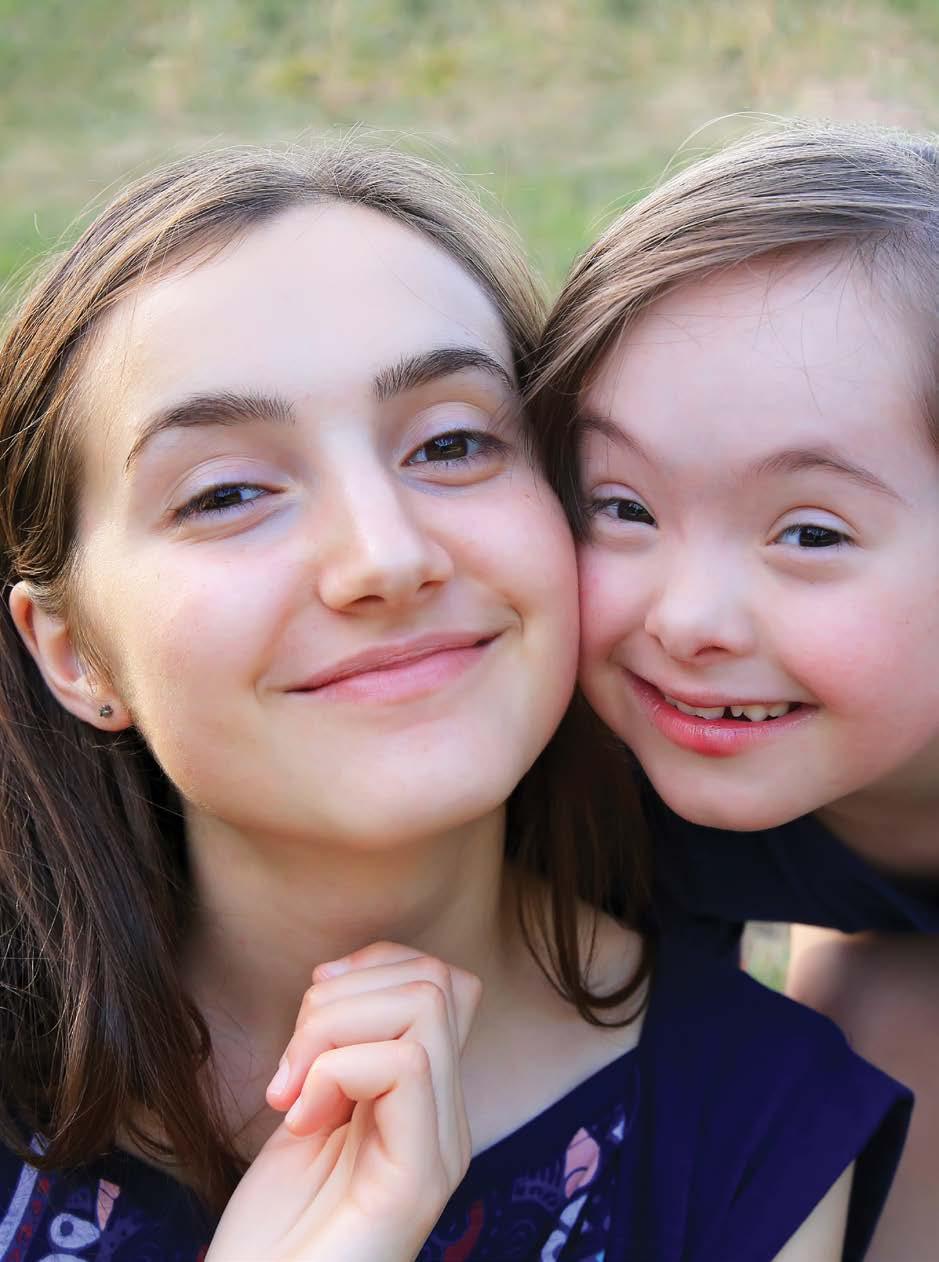
24 Quality Account | Annual and Quality of Care report 2019

Annual and Quality of Care report 2019 | Quality Account 25
1. Inclusive and responsive services
How we’re supporting statewide commitments to diversity and inclusive care

26 1. Inclusive and responsive services | Annual and Quality of Care report 2019
Closing the health gap
Aboriginal and Torres Strait Islander communities




Speak Up, Speak Out
A new approach to promoting safe, equal and respectful relationships in Aboriginal and Torres Strait Islander communities.

Launched in May 2019, Speak Up, Speak Out provided education and skills development to Aboriginal and Torres Strait Islander students to understand healthy, supportive and safe relationships.
A pilot project, the program supported 15 young people aged 10–12 from Moreland and Hume, through education, upstander action training and connection to culture and community.
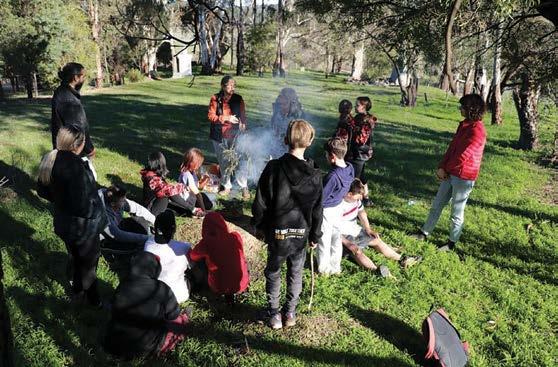
Led by former AFL Essendon player Courtenay Dempsey, participants from across six schools gathered fortnightly across seven yarning circles. Training and leadership workshops were based at the Essendon football club and
included an overnight camp, where participants learnt about safe social media use, and consent in relationships.
Connection to culture saw the participants make their own possum skin artwork, learn ancient traditions with stories from Uncle Phil, enjoy a traditional kup murri dinner, and Wayapa workshops: a traditional movement that can be used daily to connect to the environment and quiet the mind.
The success of the pilot has seen an increase in enquiries from surrounding schools to support other young Aboriginal and Torres Strait Islander students. In response, we have been successful in receiving additional funding to support another 15 students.
The current group is set to complete the program in July/August 2019.
Annual and Quality of Care report 2019 | 1. Inclusive and responsive services
Speak Up, Speak Out is a partnership project between The Long Walk Trust and Merri Health.
Programs like Speak Up, Speak Out are important for young Indigenous kids because it empowers them with the skills and confidence to become respectful future leaders within their communities.”
— Courtenay Dempsey
Above: Students at Speak Up, Speak Out camp.
Reconciliation Action Plan
An organisation-wide approach to closing the health gap
In early 2014, Merri Health formalised its existing work with Aboriginal and Torres Strait Islander communities by creating a Reconciliation Action Plan (RAP). The plan details our commitment to closing the health gap and reconciliation.
Looking back
Status Area What we did
Met Cultural learning
Working together and focusing on local Aboriginal and Torres Strait Islander people, our plan looks to:
• make a positive difference in their lives
• ensure our sites and services are culturally safe
• improve service access and cultural appropriateness
• improve their health and wellbeing
• celebrate the contribution of locals, past and present, as well as those from the northern metropolitan catchment and across the country.
Our current plan from June 2017–July 2019 is now complete and we are now in the stages of planning our 2019–2022 RAP, which is due in October 2019. To see how we’re tracking, we have included key results under ‘Looking back’ and have included our results from this financial period under ‘Looking forward’.
Room for improvement
Met Celebration of key events
• We continue to offer cultural appreciation training for staff, volunteers and students annually, with four completed this year. Read more about this on page 29
• Select teams took part in cultural immersion sessions such as a walking trail in Darebin
• We celebrated key events such as NAIDOC Week and National Reconciliation Week by sharing the importance of these events with staff and community via our newsletters, social media, website and intranet
• We attended the NAIDOC Ball and The Long Lunch to support Aboriginal and Torres Strait Islander communities
• Expand cultural immersion sessions across the organisation
• Investigate the option of holding an event during NAIDOC Week to celebrate local Aboriginal and Torres Strait Islander people
Met Partnerships
We continued to strengthen partnerships with Aboriginalcontrolled organisations such as:
• Aboriginal Community Elders Services and The Long Walk Trust, both of which have representatives on our Reconciliation Action Plan committee. The Long Walk Trust is also a key partner in our Speak Up, Speak Out project. Read more about it on page 27
• CarerLinks North, our carer support program partnered with the Victorian Aboriginal Health Service and Wandarra Aboriginal Corporation to improve support and access for Aboriginal carers
We partnered with local Aboriginal and Torres Strait Islander people to:
• present Koorie Conversations. Read more about it on page 29
• continue our support of local providers by renewing our license with Aboriginal artist Dixon Patten — this will allow us to use artwork created specifically for Merri for another three years.
• Continue to strengthen partnerships and explore new opportunities
Met Community engagement
• We improved engagement and access to our services for Aboriginal and Torres Strait Islander people through a Koorie carers lunch, health and wellbeing education, Walk the Talk session for carers, family excursions and the Speak Up, Speak Out project
Partially met Employment
• We created a manager’s toolkit to support managers with culturally inclusive practices when advertising and interviewing
• Develop an employment strategy to increase opportunities for Aboriginal and Torres Strait Islander people
28 1. Inclusive and responsive services | Annual and Quality of Care report 2019
Looking forward
Reconciliation Action Plan committee
Committee members oversee Merri’s Reconciliation Action Plan, including planning, execution and evaluation of activities and initiatives. From 1 July 2018 –30 June 2019, the committee had 16 members which included:
• eight Aboriginal and/or Torres Strait Islander people — which is 50%
• one community member, Sue Lopez-Atkinson
• four representatives of Aboriginal controlled organisations: Leanne Brooke from The Long Walk Trust, Rhonda Watson from the Aboriginal Community Elders Services, Cathy Austin from Aborigines Advancement League, and Maria Dugan from WanPlace
Merri representation included staff from various areas including community wellbeing, marketing and communications, community engagement, CarerLinks North (carer support), Victims Assistance Program and human resources.
Celebrations
The Long Lunch
The Long Lunch was held on the 23 May 2019 and celebrated the 15th anniversary of Michael Long’s walk from Melbourne to Canberra. Michael walked 650km to visit then-prime minister John Howard, to put Indigenous issues back on the national agenda.
An initiative of the Long Walk Trust, this event is a key fundraising activity that supports their community programs.
Six members of our Reconciliation Action Plan committee attended the lunch along with two Board members. We attend this event to support our partners, show our public commitment to reconciliation, celebrate events of significance and also recognise the contributions of our RAP committee members.
NAIDOC Ball
A ‘jewel in the crown of Victoria’s NAIDOC week’, the NAIDOC Ball is an opportunity for Indigenous and nonIndigenous people to come together and celebrate the history, culture and achievements of Aboriginal and Torres Strait Islander peoples.
Enjoying a night of dinner, dancing and cultural celebration, we had 10 Reconciliation Action Plan committee and community members attend the event as part of our commitment to supporting Aboriginal and Torres Strait Islander communities and events and acknowledging celebrations of significance.
Site audits
Safe, accessible and welcoming sites are important. To assess how our sites are performing, Liz Phillips, our Koorie Community Engagement Officer completes site audits every year. Sites are given a score out of 9, and assessed on items such as:
• visible Aboriginal and Torres Strait Islander flags and artwork in reception
• acknowledgement plaques at the entry of the building
• inclusive communication, newsletters and newspapers.
Throughout 2018, Liz audited 10 Merri sites. Overall, the sites scored an average 5.95 out of 9, which means ‘Your intentions are good. Your service/ site has made a start and shows potential to becoming a welcoming environment.’ Six of the sites surveyed scored 6 or above — five of these sites had dedicated reception areas.
Select Merri sites do not have dedicated reception areas as they are not drop-in sites. Of these, Liz audited three sites and they scored 5 out of 9.
As we continue to expand support in regional Victoria, we acknowledge that our current audit may not be inclusive of the many Aboriginal communities in that area. As such, Liz will work with Lisa Cambareri, our Koorie Engagement Worker in regional Hume, to review our audit for inclusiveness.
Doing well Acknowledgement plaques and Aboriginal and Torres Strait Islander flags at most sites
Room for improvement
Better promotion of Aboriginal-specific services at our sites
Education and cultural appreciation
Providing education for our staff, volunteers and students is an important part of helping to close the health gap.
Every year we run a cultural awareness training program to build their knowledge on working with Aboriginal and Torres Strait Islander people. The training is delivered by AJ WilliamsTchen of Girraway Ganyi Consultancy and supported by Liz Phillips, our Koorie Community Engagement Officer.
In the 2018/19 financial period we held four education sessions and had 32 staff, volunteers and students attend. Since commencing this training in 2012, 350 participants have completed it including those past and present, with 50% of our current staff and volunteers having attended the training.
Koorie conversations
Learning the history and experience of first nations peoples
An initiative of the Reconciliation Action Plan committee, Koorie Conversations are an opportunity for staff to learn firsthand about the lives, history, and personal experiences of Aboriginal and Torres Strait Islander people living in Moreland, in a relaxed and informal environment. Each Koorie Conversations is open to 15 staff to ensure an intimate environment.
In the 2018/19 financial period we held four Koorie Conversations, and heard from Bev Murray, Colin Mitchell, Annette Sax and Maria Dugan.
Annual and Quality of Care report 2019 | 1. Inclusive and responsive services 29
Use the tool
From Symbols to Systems framework and self-assessment tool launched in February 2019 and is available for all organisations at bit.ly/2nHaZ6I
From Symbols to Systems: a culturally inclusive framework
In late 2018, Merri Health began piloting From Symbols to Systems: a framework designed to support mainstream service providers to deliver culturally informed services to Aboriginal communities. A project of Inner North West Primary Care Partnership and led by Garralak Consulting, Merri was one of two organisations chosen to pilot the framework. As part of the pilot we:
• assessed our organisational practice and policies against a best-practice framework
• consulted with our RAP committee and key staff across the organisation.
Across various face-to-face workshops and online surveys, we completed a self-assessment of current practices, which helped us benchmark Merri and evaluate the framework.
From our involvement we identified key priorities that will be form part of our Reconciliation Action Plan priorities. They are:
• the need for a whole-of-organisation approach to cultural security and accountability
• improving data collection of staff and clients that identify as Aboriginal and/ or Torres Strait Islander — this will help us evaluate how we’re tracking through their experiences.



Aboriginal community support workers
Supporting carers
Each community supports carers differently. Acknowledging the unique needs of Aboriginal and/or Torres Strait Islander carers, we introduced a Community Peer Support role in May 2019.
Supporting carers via our CarerLinks North program, Samantha Jetta has brought a wealth of knowledge and connections with community.
As the role is still new and just started during the 2018/19 financial period, we’ll have more to share on the progress in next year’s report.
To learn about how we supported Koorie carers in 2018/19, see page 31.
Recruitment
Recruitment of Aboriginal workers to offer local support for victims of crime, was one of five recommendations that came from a 2015 Victims Support Agency evaluation.
Funding to support this was received by our Victims Assistance Program in regional Hume in June 2017.
Regional support
Providing services in both metropolitan and regional Victoria, it is important that we acknowledge the many Aboriginal communities across this catchment.
In response, in September 2018 we employed Lisa Cambareri, our Koorie Community Engagement Officer based in regional Hume.
While the role is not new, we had a period where it was vacant due to unexpected leave from March–September 2018. It took a few months before we were able to fill the role again, while we went through a recruitment process.
Working within our Victims Assistance Program, Lisa provides case management support at a local level for victims of crime.
In addition, Lisa has focused on building the profile of the Victims Assistance Program across the region by engaging, connecting and educating Aboriginal and Torres Strait Islander people, agencies and stakeholders in regional Hume. In addition, Lisa provides advice and mentoring to other staff to ensure services are delivered in a culturally inclusive and safe manner.
To offer immediate support, Lisa is also collocated at local police stations: Shepparton one day per week, Wallan one day every three weeks, and Benalla collocation areas are needed.
Victims Assistance Program
People supported that identify as Aboriginal and/or Torres Strait Islander:
30 1. Inclusive and responsive services | Annual and Quality of Care report 2019
Period Percentage 1 Jul–30 Sep 2018 6% 1 Oct–31 Dec 2018 7.4% 1 Jan–31 Mar 2019 6.8% 1 Apr–31 Jun 2019 4.4%
Caring for carers
Our carer support program CarerLinks North continues its commitment to supporting Aboriginal and/or Torres Strait Islander carers and families in 2019. Offering a range of activities throughout the year for Aboriginal and/or Torres Strait Islander carers, everyone comes together annually during Carers’ Week for a big Koorie carer celebration. Provided in addition to our main carer event, the event is an opportunity for Koorie carers to celebrate, connect with others and have some time to focus on their wellbeing.
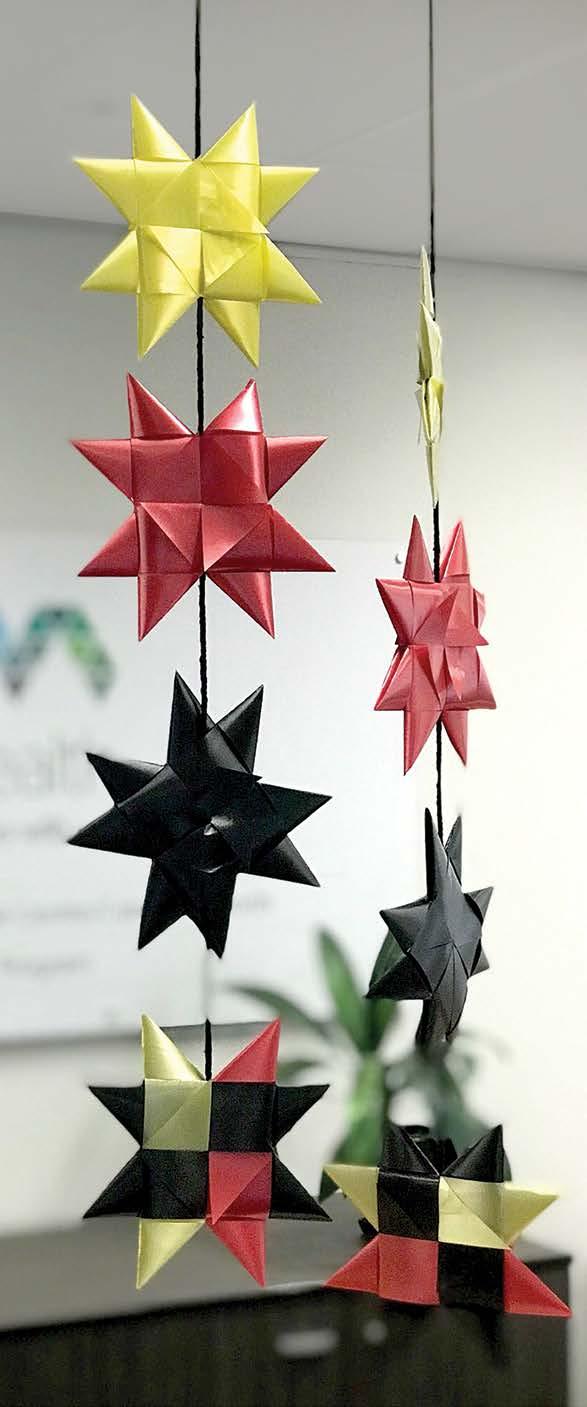
Held at the Aborigines Advancement League in Thornbury on 15 November 2018, the lunch was attended by 56 community members that included carers, care recipients and service providers. Highlights included a performance by the Stray Blacks and comedian Denise McGuinness, who used humor to highlight the importance of having a bowel screening test.

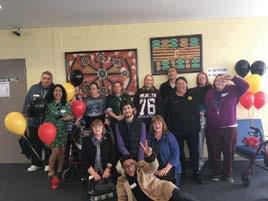
Annual and Quality of Care report 2019 | Quality Account 31
Above: Carers attend Merri Health’s Aboriginal and/ or Torres Strait Islander carers and family day.
Rainbow pride LGBTIQA+ communities
LGBTIQA+ working group
This working group ensures Merri Health (Merri) is responsive to issues related to sexual and gender diversity, and provides LGBTIQA+ inclusive services demonstrated by maintaining Rainbow Tick Accreditation.
The group meets every six weeks and has 11 members from teams across Merri including staff that are LGBTIQA+ identifying, and a community representative.
In the 2018/19 financial year, the group was proud to:
• receive outstanding recognition by the Quality Innovation Performance assessment team as an organisation that promotes and upholds a culture of safety, providing care and support that is respectful of a person’s culture, identity and beliefs, and is free from discrimination
• be recognised by peers as an organisation that leads by example
• have led the work to develop Merri’s first LGBTIQA+ face-to-face staff training, specific to the needs of Merri and its staff, and facilitated by a working group member.
Community representation
In December 2018, Alison joined our LGBTIQA+ working group as a community representative. Alison has used Merri services for many years, and is LGBTIQA+ identifying.
Representation from people that use our services is important as they offer a different perspective. Their input ensures our work is able to improve to be more inclusive and responsive.
Alison has provided invaluable insight into the challenges experienced by someone that identifies LGBTIQA+. As part of this, Alison has lent her experience to many projects including snippets of her story shared on Joy FM for a month, to highlight options for inclusive, safe and responsive services to those seeking support, and for a Yarra Trams submission. Every year, as part of their Community Partnerships Program, Yarra Trams puts a callout for submissions to promote key issues across their tram network. Advocating for safer public transport services and inclusive spaces, Alison’s story was shared along with our vision for a rainbow celebratory tram. Our submission is a 2019 finalist! We thank Alison for supporting us and are looking forward to learning the outcome of our submission — either way, we will continue to advocate for safe public services for all.
LGBTIQA+
Note: client’s name and story have been included with their permission.
32 1. Inclusive and responsive services | Annual and Quality of Care report 2019
We are committed to providing safe and high quality services that are inclusive of all people, and through our work, address health inequities and discrimination faced by many.
Lesbian, Gay, Bisexual, Transgender, Intersex, Queer and Asexual
We acknowledge that the + sign is meant to account for the many possible ways a person can identify, but we also acknowledge that it’s not explicit in accounting for multiple identities.
Training and education Upskilling staff
Since 2014, Merri Health has been providing LGBTIQA+ training to ensure that services are safe, inclusive and responsive to the needs of LGBTIQA+ people.
Always looking to improve, in late 2018 we reviewed LGBTIQA+ training options following staff feedback. Previously we offered two options: mandatory online training via our Learning Management System, and various face-to-face options run by different external providers. Learning that offering many face-to-face options was confusing as staff were unsure which to attend, we consolidated them.
In 2019, our human resources team partnered with the LGBTIQA+ working group to develop a two-hour, face-toface training option. Acknowledging the extensive in-house experience, the session is run by an LGBTIQA+ identifying staff member. Our first session was held in June of this year, and we had 13 people attend. While this number is low, many of our staff have already completed LGBTIQA+ inclusive practice training — instead this is offered to new staff or anyone that would like to undertake a refresher session.
Empowering young people
As part of our commitment to fostering safe and inclusive school environments, our community wellbeing team has been working with Moreland school students on building skills, strategies and confidence to be an upstander when witnessing discrimination.
The training covered leadership skills and four key upstander actions that anyone can use to act safely in difficult situations.
What have we achieved?
In the 2018/19, 51 students participated in the training. This accounts for two schools and five staff.
Initial data collection reveals that peer support was highly valued, as was the creation of a safe place. The skills and techniques learnt about non-verbal responses to homophobia, biphobia and transphobia were also seen as most useful by participants.

Looking forward
In 2019/20, our team will be working with the Respectful Relationships and Safe Schools teams from the Department of Education and Training to co-facilitate upstander training. This will be delivered to:
• lead and partner school staff participating in the respectful relationships initiative
• staff from Hume and Moreland councils
• staff from Safe Schools.
Annual and Quality of Care report 2019 | 1. Inclusive and responsive services 33
An upstander is a person who speaks or acts in support of a person or cause, or intervenes on behalf of the person being attacked or bullied.
Above:
Face painting at our 2019 Midsumma stall.
Sharing our learnings
In 2014, Merri Health was the first metropolitan community health provider to receive Rainbow Tick accreditation. This means our services have been reviewed under the Rainbow Tick Standards for LGBTIQA+ inclusive practice and service delivery.
As part of our journey, sharing our knowledge is key. We are passionate about safe and inclusive spaces and services and do all that we can in sharing this with others. In late 2018, we did just this at the Dental Health Services Public Oral Health Innovations Conference. We were invited to share our journey; inform, educate, celebrate and strengthen, and answered questions to help other public services follow suit. Above is a snapshot of the poster that was on display as part of this process, which summarises our Rainbow Tick journey.
Celebrating pride
Every January we kick off the year with pride! As the start of the Midsumma Festival and Pride March, it’s an opportunity for Merri Health to connect with others, and let community know about safe and inclusive services available to them.

Every year, we have a stall at Midsumma. In 2019 our stall focused on families, so in addition to information about services and an opportunity to talk to staff, we had fun and engaging activities: face painting, giant games and temporary tattoos. We offer this as it’s an opportunity to engage with people in a more relaxing environment. Nine staff from our LGBTIQA+ working group volunteered their time over the weekend to connect people with local services, and we had more than 100 visitors stop by our stall.
Always improving: inclusive language practice
Merri Health’s intake team is the first point of contact for clients. Ensuring our processes continue to evolve and team members are up-to-date with inclusive language practices; in 2018 we liaised with Launch Housing who shared their resources on best practice.
What have we done?
In 2018/19, our community engagement coordinator in partnership with a member of our LGBTIQA+ working group, started working with our Client Intake Management System project team to embed this practice within the system itself. We have also started developing and refining scripts for intake, and are looking to offer conversational training for intake staff, so they are up-to-date with best practice. These initiatives will help us offer a more inclusive and respectful experience for clients.
In 2018/19 financial year, Merri Health recruited a community arts development assistant.
This role was developed specifically for a young person from the LGBTIQA+ community. They support our community arts and development officer with our YGLAM program.
34 1. Inclusive and responsive services | Annual and Quality of Care report 2019
Above: Our Rainbow Tick journey poster
A safe space for young LGBTIQA+ people
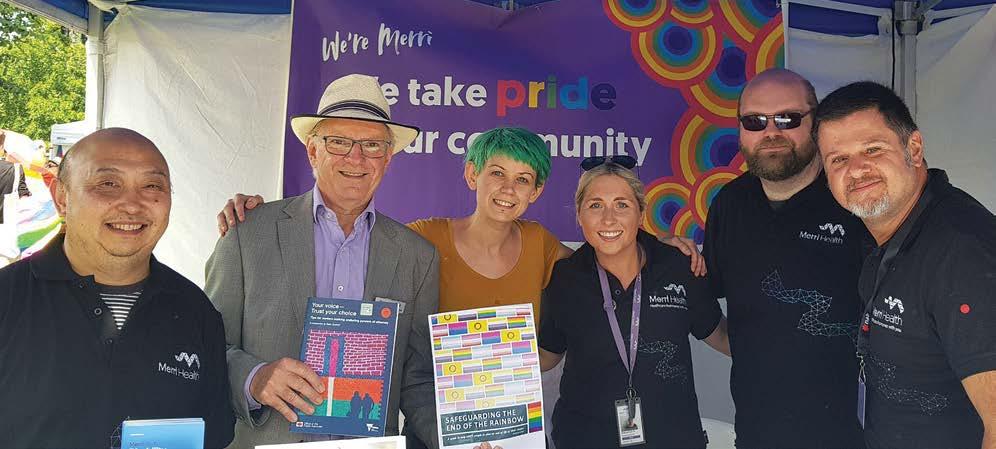
For many years, our queer youth theatre program known as YGLAM has been providing a safe space for young LGBTIQA+ identifying people to come together and explore sexuality and gender identity through artistic means. A group for anyone aged 14–25, no experience is necessary to join — just enthusiasm and commitment.
How have we supported young people?
YGLAM has completed some incredible shows over the years. This year, the team have been preparing for their performance
Self Care: an anti-musical, which explores mental health and self-care. It will be delivered as part of the 2019 Melbourne International Fringe Festival.
In 2018/19, we had an average of 11 participants and completed 44 rehearsals at the Oxygen Youth Space. Through the creation of a ‘haunted house’, Self Care allows audiences to navigate unsafe and dangerous environments, which can be experienced by young LGBTIQA+ people.
The performance was created by young LGBTIQA+ identifying people in consultation with 100 Moreland secondary school students that participate in Stand Out groups (LGBTIQA+ advocacy groups).
LGBTIQA+ health
Findings from Private Lives 2, a national survey of the health and wellbeing of gay, lesbian, bisexual and transgender Australians shows the rate of alcohol and drug use is higher among LGBTIQA+ identifying people.
Acknowledging the need for tailored services, our QHealth program offers counselling and support for people who would like to talk about the concerns or impacts of their alcohol and drug use. It is offered in a confidential, non-judgmental and queer-affirmative space, and all QHealth counsellors are LGBTIQA+ identifying.
People can self-refer and we also work closely with other organisations such as alcohol and drug specialist services, NDIS providers, and medical clinics that refer clients to QHealth.
What have we achieved?
In the last year, QHealth:
• employed three part-time counsellors that are LGBTIQA+ identifying
• supported 60 people which is an increase from last year.
QHealth is delivered based on the client’s needs rather than offering a set of sessions. This is because everyone’s journey is different. We help clients to identify their issues and support needs, and develop a plan through episodes of care.
As a short-term support program, once clients have completed their care plan with us, our counsellors link them with other services and organisations to help them on their recovery journey. Clients are also encouraged to link back with QHealth as needed.
Annual and Quality of Care report 2019 | 1. Inclusive and responsive services 35
Above: Merri Health team at the Midsumma festival 2019.
Addressing family violence and gender equity
As part of our commitment and involvement in BRC, in 2018/19 our staff and leadership completed the following training:

• Introduction to Preventing Violence Against Women
Gender inequality is the key driver of violence against women and impacts on health and determinants of health — this is why we are committed to addressing this; promoting gender equality to staff as well as clients, partners and the broader community. Below is a snapshot of how we’ve supported this in 2018/19.
A partnership approach
Building a respectful community
Building a Respectful Community (BRC) is an initiative led by Women’s Health in the North that works towards preventing family violence and violence against women, and promoting gender equity in the community. It does this by partnering and upskilling community health services, councils, Primary Care Partnership organisations and universities across the northern metropolitan region. Merri Health is one of these partners.
• Identifying and Responding to Family Violence
• Gender Equity in the Early Years
• Community-based PVAW training.
In addition, our chief executive Nigel Fidgeon presented at the leadership breakfast on how to champion upstander actions in a leadership position, and we regularly contribute to the BRC program via the steering group and Prevention of Violence Against Women Network.

A sector-wide response to the prevention of violence
INCEPT is a project led by the Inner North West Primary Care Partnership (INWPCP). It was initially created to develop evaluation indicators but in phase two, it involved the development of an online evaluation resource for partners in our region working on projects to address the prevention of violence against women. Partners include Women’s Health in the North, Women’s Health West, Moreland City
Council, cohealth, Access Health and Community, and Merri Health.
As part of the project, we are supporting the INWPCP to develop an online evaluation resource for use by partners to improve the evaluation on the prevention of violence against women across the region. This resource will include information about how to conduct an evaluation, indicators, data collection tools and infographic tools for displaying data. The result we’re aiming for is that we all use similar or shared indicators for better evaluation and comparison of our collective work across the region.
In the 2018/19 financial period, we contributed to the working group to design the online evaluation resource and have initiated a pilot test. The INWPCP will conduct a larger test before finalising and sharing in 2019/20.
36 1. Inclusive and responsive services | Annual and Quality of Care report 2019
The ‘Gender Equality at Merri Health’ project is a phased, whole-of-organisation approach to the primary prevention of violence against women.
Above: Our CEO Nigel Fidgeon at the leadership breakfast.
Above: (From left) Women’s Health in the North chief executive Helen Riseborough, Victorian Human Rights and Equal Opportunity Commissioner Kristen Hilton, and Merri Health chief executive Nigel Fidgeon.
Training and education Leadership support
The Human Rights Commission estimates that violence from an intimate partner affects one in six Australian female workers. Male employees also experience family violence; however, the statistics are less known. Therefore, at some point in their careers, many managers will, knowingly or unknowingly, encounter a staff member who has experienced family violence.
Merri Health supports both staff and clients impacted by family violence. For staff, receiving the right support can make a huge difference: it can impact their perception of their workplace, and can be the difference between staying in an abusive relationships or taking action to address it.
In response, we offer our leadership team online training on Responding to Family Violence in the Workplace. It provides managers with the knowledge and skills needed to support a staff member going through family violence.
Initially, all managers were expected to attend face-to-face training or participate in a workshop that was held during a leadership meeting. Now, we offer an online module that managers are encouraged to undertake at a time where family violence is suspected. We do this so information is always current and sensitivity can be applied.
Responsive services Victims Assistance Program
Merri Health’s Victims Assistance Program offers support for people who have experienced a violent crime against them. We help them cope with the effects of the crime, help to explain ‘legal talk’, and find services that are right for them.
What have we achieved?
In the 2018/19 period we supported 1802 new clients in the northern metropolitan region, and 617 in regional Hume.
Since late 2018, our Koorie Engagement worker for regional Hume has also helped with responding to cultural needs, that has seen referrals for Aboriginal and/or Torres Strait Islander people increase to 6%.
Support in the Children’s Court
While Merri Health has a range of services that support people impacted by family violence, in 2018 we introduced a new service that offers support at the Melbourne Children’s Court.
Driven by recommendation 126 of the Royal Commission into Family Violence, the program offers specialist, family-focused support for young people and their families attending the Melbourne Children’s Court as a result of the young person allegedly using violence in the home.
Annual and Quality of Care report 2019 | 1. Inclusive and responsive services 37
Staff under Merri Health’s newly introduced Industrial Agreement now have access to 20 days of family violence leave per year.
Number of people we supported across Victoria through our Victims Assistance Program
2419
Keeping Our Pets Safe project
A project of Merri Health’s Victims Assistance Program, Keeping Our Pets Safe focuses on the safety of pets when family violence is occurring. It also raises awareness of a pet’s position as both a victim and a barrier to fleeing family violence.
Acknowledging we cannot make change on our own, we have partnered with seven northern metropolitan councils and the nation-wide Lucy’s Project to identify animal-friendly and respite services, address legislation and pet registration, and upskill councils to respond to the need to keep our pets safe.
Keeping Our Pets Safe is working with members of:
• animal welfare officers
• Melbourne University
• Council Community Safe Teams
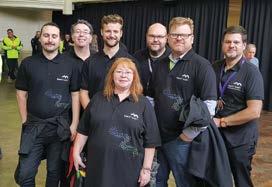
• Cherished Pets

• EDVOS — specialist family violence service
• RSPCA
• Lort Smith Animal Hospital
• Department of Health and Human Services
• Victoria Police.
The project has encountered some obstacles as we wait for the local councils to formulate policies, protocols and procedures around their animal welfare programs and shelters. However, Epping Animal Welfare Shelter in conjunction with the RSPCA has just finalised theirs to accommodate pets whose owners are experiencing violence in the home.
In the 2018/19 financial period, we were a part of Lucy’s Project’s conference held at Melbourne University as a sponsor and panellist. We addressed:
• accommodation issues
• the role of pets in families as therapy
• the concerns around legislation and registration
• programs in Australia that are already established in supporting pets.
The next stage of the Keeping Our Pets Safe project will see us continue working with councils until a pet-safe accommodation network is developed, and continue to attend the Lucy’s Project Victorian chapter meetings on a monthly basis. We will also be focusing on creating a training calendar for Vet students, staff and volunteers to learn how to identify and respond to family violence where a pet is concerned.
White Ribbon
White Ribbon is part of a global movement working to end male violence against women. It focuses on stopping violence before it occurs, by challenging stereotypes, attitudes and raising awareness.
As part of our ongoing commitment, our team were actively involved in Moreland Council’s White Ribbon Day working group meetings throughout 2018, and on the 23 November 2018, we joined their annual White Ribbon Day march.
While the initial plan was to march down Sydney Rd Coburg to raise community awareness, due to bad weather the march turned into a community gathering at Moreland Council’s civic centre.
About 200 people attended, including seven Merri employees that represented our various teams. There we heard from key speakers from council, Victoria Police and State Government, who shared what their organisations were doing, and how together we can work towards ending gendered-based violence.
38 1. Inclusive and responsive services | Annual and Quality of Care report 2019
We acknowledge perpetrators and victims of violence can be of any gender, however White Ribbon focuses on men. This is as statistics show about 95% of all victims of violence, whether women or men, experience violence from a male perpetrator.
Above: Keeping pets safe from family violence.
Above: Merri Health team at Moreland’s White Ribbon gathering 2018.
Child Safe Standards
Keeping children safe
The Victorian Government has introduced Child Safe Standards to improve the way organisations that provide services for children prevent and respond to child abuse.
The standards are compulsory for all organisations providing services to children, and aim to drive cultural change so that protecting children from abuse is embedded in the everyday thinking and practice of leaders, staff and volunteers.
The Standards:
• prevent child abuse
• encourage reporting of child abuse
• improve responses to any allegations of child abuse.
Merri Health is committed to child safety and has a zero tolerance to child abuse. All allegations and safety concerns will
be treated very seriously. We have a legal and moral obligation to contact authorities when worried about a child’s safety, which is followed carefully. We also focus on preventing child abuse by identifying risks early and removing or reducing these risks.
In addition, we are also committed to the cultural safety of all children, including children from a culturally and/ or linguistically diverse background, Aboriginal and/or Torres Strait Islander, and with a disability.
How are we meeting the Standards?
• all Merri staff are responsible for the care and protection of children within their care, and will report suspected child abuse
• our human resources and recruitment practices are thorough and include training and education on child abuse risks
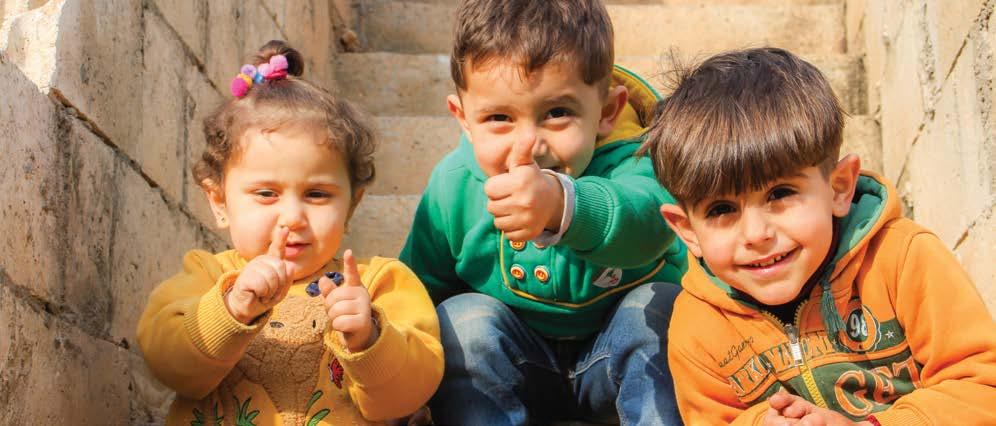
• we have an automated system that reviews the status of police checks and professional registrations to ensure they are up-to-date
• we have systems and processes in place to ensure we are complying with regulations and are up-to-date with information from government departments, funding bodies, peak bodies and the law
• our responsibilities and progress are shared across our leadership team
• staff have access to support from our Quality team as needed
• our policy and procedures are kept in line with legislative, regulatory and program requirements — we have a monitoring and auditing system in place to review these.
Annual and Quality of Care report 2019 | 1. Inclusive and responsive services 39
Above: At Merri Health we keep children safe through statewide Standards.
Responding to cultural and linguistic diversity
Diversity and disadvantage are defining characteristics
How are we tracking?
In the 2018/19 financial period, key outcomes from the plan included:
• a community participation register: Merri clients are invited to join the register to offer their input and advice into key projects and initiatives, based on their experience. There are currently 24 people registered
Diversity plan
Our diversity plan sets the overall direction and goals for our organisation, in relation to diversity planning and practices for groups that are more likely to experience disadvantage.
The plan focuses on five key groups:
1. Aboriginal and Torres Strait Islander peoples
2. culturally and linguistically diverse communities
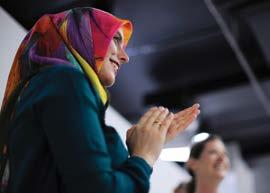
3. people with dementia
4. people experiencing financial disadvantage
5. LGBTIQA+ communities.
The plan is reviewed quarterly with updates on our progress provided to our funders.
• feedback kiosks available at key Merri sites to collect client feedback in real-time, and available to complete in Merri’s top five languages
• occupational therapy services for older people available from our Glenroy site to respond to local demand.
In response to our community participation register initiative, our community engagement coordinator Jess Dorney was invited to present at North and West Metro Sector Diversity Forum. Jess shared our journey of establishing the register with approximately 100 people, in an effort to encourage other service providers to consider how they incorporate the voice and experience of consumers.
32
90
completed LGBTIQA+ inclusive practice training
40 1. Inclusive and responsive services | Annual and Quality of Care report 2019
of the area we serve. Below is a snapshot of how we respond and are kept accountable to providing inclusive and responsive services.
completed Aboriginal and Torres Strait Islander cultural appreciation training Above: Supporting our diverse community.
Diversity training
Merri Health staff, volunteers and students are provided with various training opportunities to help them succeed in their role.

Our face-to-face Diversity and Inclusion in the Workplace training is offered three times per year and run by the Victorian Equal Opportunity and Human Rights Commission. 32 staff completed this training in the 2018/19 financial period.
With 386 staff and 99 volunteers working across 10 sites in metropolitan and regional Victoria, our human resources team is currently working on finalising an online training module addressing cultural and linguistic diversity, using our Learning Management System. This supports efficiency and supports people to complete the training in their own time and at their own pace.
We acknowledge that diversity isn’t just cultural and linguistic. Inclusive practices when working with Aboriginal and/or Torres Strait Islander people and anyone that identifies lesbian, gay, bisexual, trans, intersex, queer, asexual (LGBTIQA+) is also important.
In response, we offer LGBTIQA+ inclusive practice training and Aboriginal and Torres Strait Islander cultural appreciation training. The snapshot to the left shows how we’re tracking.
Count Me In 2
Sport participation for refugee and migrant women and girls
Count Me In 2 is a sports participation program targeting women and girls from refugee and migrant backgrounds. The program uses sport as a vehicle for change. Refugee and migrant families are supported to connect with mainstream sporting clubs, helping improve social inclusion and wellbeing, and strengthen community cohesion. We also work with sporting clubs to create safer, more inclusive environments for refugee and migrant families, and are trialling new strategies to reduce participation barriers for girls and women.
This program is a collaboration with Moreland City Council, and is an adaptation from the original Count Me In model that we piloted in 2017.
Why focus on refugee and migrant young people?
Sport offers a range of physical and psychosocial benefits for young people1 For those from refugee and migrant backgrounds, it can also build social inclusion and capacity to take part in Australian society.
However, sport participation rates for youth from refugee and migrant backgrounds are low. Participation barriers include cost, discrimination, lack of transport, culturally determined gender norms and family attitudes2.
Outcomes from the 2018/19 financial period
Participants have engaged in a number of ways: registered with a club, attended one or more ‘try out’ sessions, helped out as a volunteer, and participated in training/leadership opportunities.
A total of 101 people engaged in ‘try out’ sessions: 69 women and 32 girls.
Of these:
• five formally registered with a club
• two are volunteering with Northern Saints Football Club
• two have participated in a Centre for Multicultural Youth leadership training. We also partnered with Tennis Victoria to extend sporting opportunities, and are working with three local tennis clubs: Fawkner, Moomba Park and Merlynston.

Annual and Quality of Care report 2019 | 1. Inclusive and responsive services 41
1 Block, K., & Gibbs, L. (2017). Promoting Social Inclusion through Sport for Refugee-background Youth in Australia: Analysing Different Participation Models, Social Inclusion, 5(2), 91–100. 2 Caperchione, CM., Kolt, GS., & Mummery, WK. (2009). Physical activity in culturally and linguistically diverse migrant groups to Western society: A review of barriers, enablers and experiences, Sports Medicine, 39(3), 167–177.
number of women and girls that engaged with sports as part of Count Me In 2
101
Above: Count Me In 2 participants.
Above: Word Play participants.
HIPPY excursion
Since 2008, our school readiness program known as HIPPY (Home Interaction Program for Parents and Youngsters) has been working with children and their families from Fawkner and surrounding suburbs, to prepare for their first year of school. Supported by home tutors, parents are upskilled to be their child’s first teacher.
The program is based in Fawkner as it is one of Melbourne’s most disadvantaged suburbs and home to many newly arrived and refugee families.
With many families not having the opportunity to explore Melbourne, every year we offer a city excursion by train, so families can explore with people they know.
Supported by home tutors, for many families it was their first time catching the train. 15 parents, 18 children and five prams joined the excursion, as we explored Docklands, St Paul’s Cathedral, Hosier Lane and Melbourne’s CBD area by tram.
The day was a success and an opportunity for families to see that there are learning opportunities everywhere, something that is a big part of the HIPPY program.
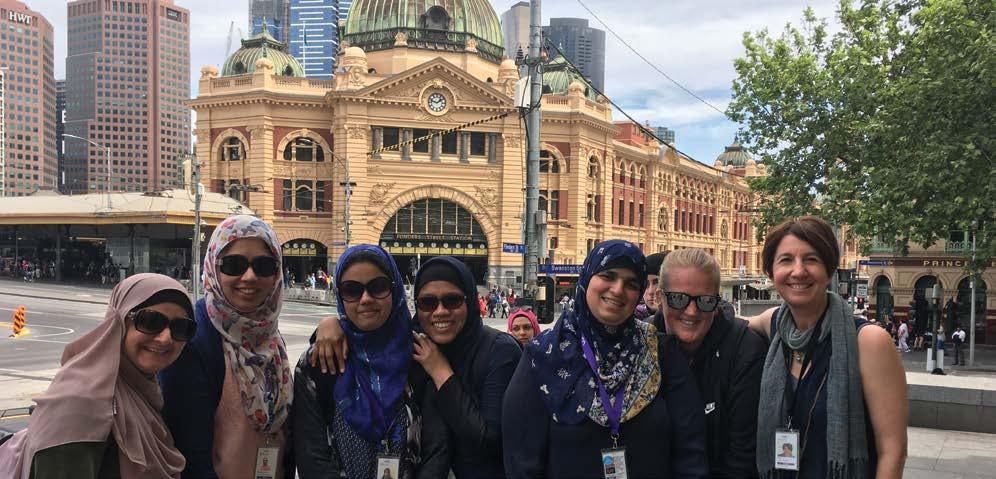
42 1. Inclusive and responsive services | Annual and Quality of Care report 2019
of Fawkner children starting school are developmentally vulnerable
25.5%
Above: The HIPPY team visit Melbourne.
Join Word Play
Tuesday
12 February 2019–Tuesday 17 December 2019
10.15am every Tuesday during school term
Fawkner Library, Jukes Road, Fawkner
Word Play
Pilot success sees literacy program for migrant families embedded into Moreland City Libraries’ regular programing in Fawkner.
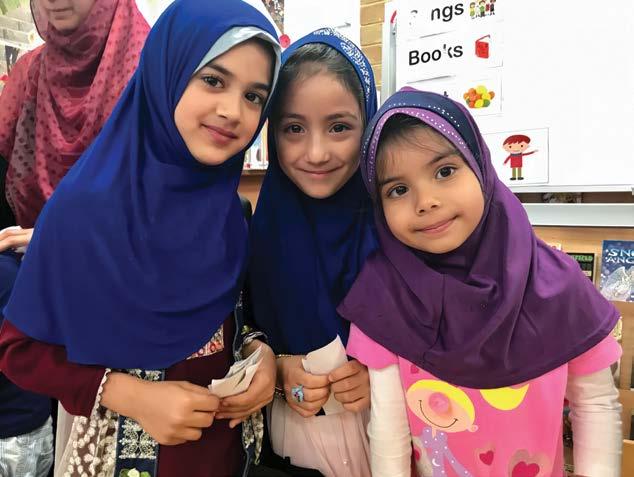
Following a successful pilot period throughout 2018, Word Play is a now a regular fixture on Moreland City Libraries’ Fawkner programming.
A dynamic literacy learning model targeting newly arrived migrant families with low English literacy, Word Play saw participants learn through songs, games and books, with an emphasis on families learning together with the support of reading buddies.
How we chose the location
Addressing cultural diversity and disadvantage, the program was piloted in Fawkner which rates 28th on the most disadvantaged suburbs in Victoria (SEIFA score: 901.7). 68.8% of Fawkner households are parents with children and 66.7% of residents speak a language other than English at home1
Outcomes 2018/19 financial period
During the 2018 pilot, we:
• delivered 23 sessions
• engaged 35 families
• worked with three bilingual volunteers. Pre- and post-evaluations show improvements across all seven program objectives, in particular, improving children’s English literacy and schoolreadiness, and the capacity of parents to support their child’s learning.
What participants said
• 80% agreed that Word Play helped improve their own English
• 90% believed participation had improved their child’s English literacy.
Other outcomes included building social connections for better community inclusion and cohesion, improving mental health for children and adults, and creating opportunities for volunteers to boost wellbeing through their participation.
How we’re supporting long-term success
To support its ongoing sustainability following the pilot, the 10 most successful sessions were integrated into a toolkit. This includes themes, instructions for games and activities, and a collection of resources. By bringing together the materials necessary to deliver the program, sessions can now be run independently by the library into the future.
Annual and Quality of Care report 2019 | 1. Inclusive and responsive services 43
1 Australian Bureau of Statistics 2016, 2016 Census QuickStats: Fawkner (online). Available from: https://quickstats.censusdata.abs.gov.au/census_services/getproduct/ census/2016/quickstat/SSC20903?opendocument (Accessed 8 July 2019).
It’s FREE!
Above: Locals take part in Word Play.
2. Partnering with consumers

44 2. Partnering with consumers | Annual and Quality of Care report 2019
How we’re engaging consumers and working together for better care.
In the community
Hello, Fawkner!
Hello Fawkner! is a local project that highlights and strengthens the incredible things that happen across the diverse suburb of Fawkner.

A place-based approach, Hello Fawkner! is working to improve social connections in Fawkner. We do this through a range of projects that build leadership skills of local residents, to support them to develop and implement initiatives that bring community members together.
Why Fawkner?
This initiative is led by our Community Wellbeing team that focus on improving health outcomes for Moreland.
As a culturally diverse region with a large proportion of newly arrived families, Fawkner is rated the 28th most disadvantaged suburb in Victoria with a SEIFA score of 901.7.
How we’re tracking
The three-year project has developed and/or completed a range of initiatives in the 2018/19 financial period.
Completed
• Harmony Day: throughout March 2019, we funded 17 communityled celebrations across Fawkner, providing locals with $100 per celebration. Participants had to ensure their event was inclusive and celebrated cultural diversity.

In progress
• community leadership program called the Great Idea program: we funded three local projects to help ‘turn ideas into reality’. They include Lost Recipes of Fawkner, Cook, Dine and Shine and bulk food store called Fawkner Wholefoods Collective. These will be developed and implemented throughout the 2019/20 financial period
• monthly online newsletter shared electronically with Fawkner residents, with an e-membership of 402 people
• The Fawkner Times bi-annual community newspaper available in print throughout Fawkner. The first edition launched in June 2019 with 2500 copies distributed to households and other locations in the community, reaching 4902 people. It was also shared electronically with our newsletter e-membership. The Fawkner Times is working towards a community-run model, with staff currently upskilling creatives and community in Fawkner to take over the newspaper in 2020.
Annual and Quality of Care report 2019 | 2. Partnering with consumers 45
Above: Harmony Day celebrations in the community.
Taking services to community
In 2018, we took select services on the road in an effort to reach vulnerable, disadvantaged and at-risk Victorians.
Fawkner Festa
Fawkner is home to one of Melbourne’s most culturally diverse areas and the Fawkner Festa. Led by Moreland Council, the annual celebration is an opportunity to bring community together and enjoy local music, performances, workshops and activities.
In late 2018 we joined the Festa with a Merri Health marquee. We offered a range of free activities including henna painting, children’s play, badge making, cultural face painting and health checks.

An opportunity to connect with locals in a relaxed and fun environment, teams from across Merri connected with more than 500 people throughout the day. We learnt that more than half were not aware of Merri Health and support they can access through community health.
In addition, we partnered with the local Urdu-speaking women’s group to create some short videos throughout the day to further develop social connections online.
Be Merri health and wellbeing festival
Now in its second year, our team hit the road as we took Be Merri, our roving week-long festival beyond Moreland this year, visiting Craigieburn, Coburg, Fawkner, Broadmeadows, Preston and Brunswick West.
We attended local shopping centres and outdoor areas in the community with activities like lung checks, diabetes assessments, jewellery making, easy exercise in the park, story time in the library, face painting and more.

Our health checks, in partnership with Priceline Pharmacy Brunswick West were a hit, as locals had their iron, cholesterol and sugar levels checked, and were shown how to do a breast check using a prop.
As the festival drew to a close in Northland on Friday evening, our carer team drew a name out of a box from those that participated in our Quiz Master game, with Moreland local Isabella the lucky winner of the $100 Rebel Sport voucher.
“I was there for an outing with my baby and wanted to chat to someone. The team were really friendly and it made such a difference to my day. Thank you — it really left me with a smile on my face,” said Isabella.
Thank you to everyone that attended and to our wonderful partners that helped make it possible; Moreland City Council and its Coburg and Fawkner libraries, Priceline Pharmacy Brunswick West, Vision Australia, Urdu-speaking women’s group, Northern Badminton Club, The Community Grocer Fawkner, Centrelink and My Health Record. Thank you as well to our wonderful community member and designer Mary Lin, who worked with our team to design the materials for the festival, our t-shirts and reusable tote bags.
46 2. Partnering with consumers | Annual and Quality of Care report 2019
the best thing about cultural diversity? Find out at bit.ly/2ZeqC3A Above: Our Fawkner Festa marquee.
What’s
Above: Locals take part in plant potting activity at Be Merri.
Help us plan Be Merri 2020
1300 637 744 and ask to speak to our Communications
communications@ merrihealth.org.au
How did we go?
Over five days, we:
• had 358 conversations with community
• connected people with 14 services
• engaged 10 volunteers
• partnered with eight local organisations/businesses and council.
Did you know we have a Consumer Participation Register?
Merri clients are invited to join the register to offer their input and advice into key projects and initiatives, based on their experience. There are currently 24 people registered.
Read more about it on page
Building community connections
Supporting the Urdu-speaking women’s group
Now in its third year, the Urdu-speaking women’s group is a networking group for women living in and around Fawkner who understand Urdu. Supporting social connections, we provide the group with guest speakers each week and a chance to meet other Urdu-speaking women. We also support and can refer members to local health, social services and volunteer programs, and have linked them with opportunities like the CERES food business incubator program, and Fawkner Community House employment mentoring project.
Rapidly growing, the group now has many members who stay connected via What’s App.
What did we achieve?
As the funding period comes to a close, the ability to be able to keep the group going without Merri’s support has been key. With this in mind, we supported members to run elections so that the group is overseen by a volunteer community committee.
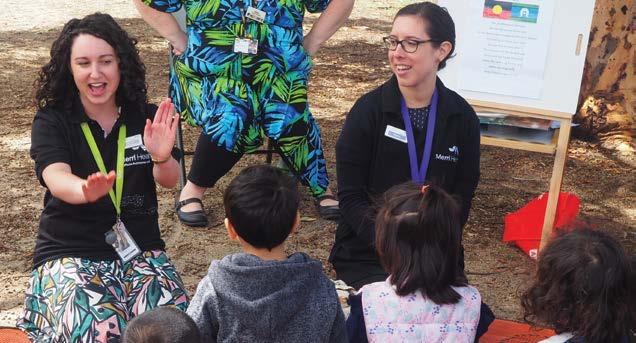
Annual and Quality of Care report 2019 | 2. Partnering with consumers 47
I was there for an outing with my baby and wanted to chat to someone. The team were really friendly and it made such a difference to my day. Thank you — it really left me with a smile on my face.”
— Isabella
team
Above: Story time activity at Be Merri.
Working together
Building our Community Participation Register
Our community participation register is a live and evolving database of consumers and carers that have registered their interest in using their experiences to contribute to decision making of Merri Health projects. This includes design, planning and evaluation phases of projects, marketing collateral and programs. They are also informed of any participation opportunities. People register their interest, including topics they would like to contribute to based on their experience.
What have we achieved?
There are currently 24 consumers registered, however a key objective in 2020 is to expand this by 40%. In the 2018/19 financial year, consumers and carers from this register participated by:
• giving feedback on our new marketing brochure that outlines all Merri Health services, the annual report and Collaborative Pairs project
• planning of the North Western Consumer and Carer Networking Forum — read more on the right
• giving feedback on how-to-use signage about our feedback kiosks
• leading a project to improve our feedback form and how to increase feedback received.
We also successfully applied for a consumer to attend the Giant Steps conference by Safer Care Victoria via a scholarship.
Consumer and Carer Networking Forum

The Consumer and Carer Networking Forum brings together consumers from across the north and west metropolitan area, to support them in their role as consumers representatives at their respective health services.
An opportunity to connect and learn, consumers hear from others, and are offered the opportunity to share what’s important to them for future planning. This year’s theme was inclusion and we had 80 people attend.

Bringing together 13 organisations (cohealth, IPC Health, Primary Health Network North Western Melbourne, St Vincent’s Hospital, Dental Health Services Victoria, The Royal Melbourne Hospital, Sunbury Community Health, Your Community Health, DPV Health, Peter MacCallum Cancer Centre, Eye and Ear Hospital, Western Health, and Merri Health), in 2019 consumers heard from a panel discussion and took part in group activities on different topics.
Why do we do it?
Through this partnership we are able to achieve much more than we would be able to alone, due to sharing of resources and planning capacity. The collaboration of health services is a great thing and consumer and carers love the opportunity to network and find out what others are doing, as well as learn about upcoming projects and initiatives.
What did we learn?
From the panel discussion, there was a common theme of poor communication across different communities, in particular, language and cultural barriers between staff and consumers.
We also learnt that staff sometimes lack knowledge of different communities, such as the values and medical needs of LQBTIQA+ people.
48 2. Partnering with consumers | Annual and Quality of Care report 2019
Above: Consumers taking part in the networking forum.
Collaborating for better care
Staff and consumer team up to improve feedback processes.
Working together towards a shared goal was a key outcome of the Collaborative Pairs project. The project brought together health service providers and consumers to develop their capacity to work together to improve health care.
Merri Health took part in the pilot that started in 2018, with our Quality and Risk Coordinator Amelia Watkins, and consumer Rowena taking part in the fivepart leadership training program.
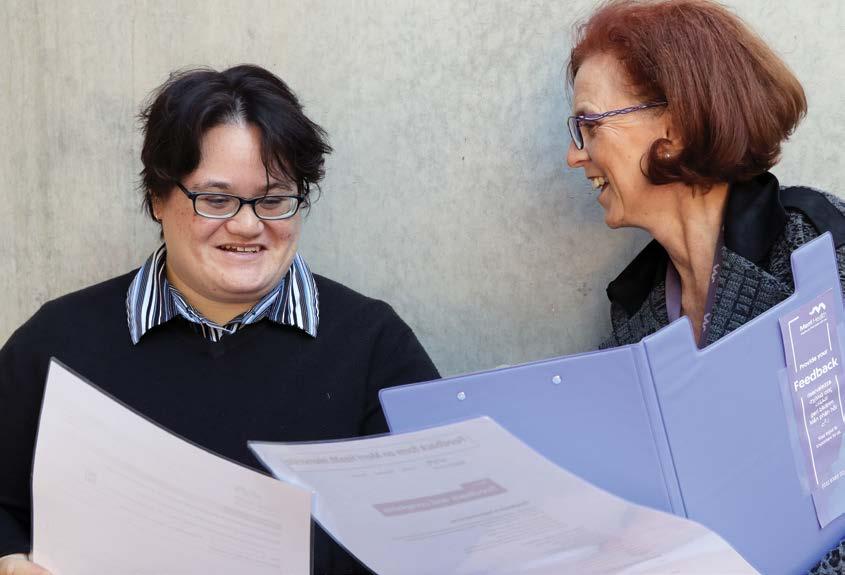
Looking to work on a current issue, Amelia and Rowena chose to address Merri’s feedback and complaints process. They chose this issue following feedback from consumers about negative experiences they had when providing feedback. Together, they reviewed our current process, identified what was and wasn’t working and whether people were aware of the process, and captured their experience when providing feedback.
The project has resulted in an update to our feedback form to make it easier to
use and more inclusive. It now includes how to use an interpreter or the National Relay Service to provide feedback, and the inclusion of emojis which people can circle. These changes will also be used to update the online form.
Following this, Rowena will also work with our marketing and communications team, quality and risk team and community engagement coordinator to provide guidance on how we communicate these changes, and improve people’s knowledge of our feedback process.
In addition to getting better insights as the project was led in partnership with a consumer, we were also able to add value to Rowena’s future plans.
“I’m hoping to get into disability advocacy so this will help with my career. It sounded like an excellent opportunity.
“It challenged my preconceptions of what a clinician is like, and Amelia and I had to overcome those assumptions to get a better working relationship,” Rowena said.
Collaborative Pairs was developed by the King’s Fund in England and run by the North Western Melbourne Primary Health Network and Consumer Health Form of Australia.
Note: client’s name has been included with their permission.
Annual and Quality of Care report 2019 | 2. Partnering with consumers 49
I’m hoping to get into disability advocacy so this will help with my career. It sounded like an excellent opportunity. It challenged my preconceptions of what a clinician is like, and Amelia and I had to overcome those assumptions to get a better working relationship.”
— Rowena, consumer
Above: (From left) Rowena and Amelia working on the Collaborative Pairs project.
Use of interpreters
Cultural and linguistic diversity is a defining characteristic of our area. Demand for both face-to-face and overthe-phone interpreter services continues to grow, and is a key support used by non-English speaking clients.

Based on data from our interpreter service provider OnCall, we’ve seen a slight drop in the number of requests for interpreters: 1885 in 2017/18 compared to 1818 in 2018/19. There has also been a change in the top five languages requested by our clients, with Farsi as an emerging language this year.
To meet the needs of community, we track how client requests are changing. Below is a snapshot of interpreter requests: a break down per month, and our top languages.
Top languages 2018/19
Top languages requested
50 2. Partnering with consumers | Annual and Quality of Care report 2019
Period Facetoface Overthephone Total July 2017–June 2018 1,184 701 1,885 July 2018–June 2019 1,154 664 1,818 Difference -30 -37 -67
Table 1: Number of interpreter requests
1. Arabic
2. Italian
3. Greek
4. Turkish
Jul 18 156 Mar 19 165 Nov 18 145 Sep 18 127 May 19 215 Jan 19 141 Aug 18 162 Apr 19 152 Dec 18 119 Oct 18 168 Jun 19 125 Feb 19 143 Interpreter bookings per month July 2018–June 2019
5. Farsi
Arabic Italian Greek Turkish Farsi Mandarin Assyrian Vietnamese Cantonese Somali All other languages (27) 30% 543 20% 356 11% 193 9% 172 5% 90 4% 78 4% 67 3% 48 2% 35 1% 27 11% 209
Above: Working together with people to better meet their needs.
National Disability Insurance Scheme
The National Disability Insurance Scheme (NDIS) roll out began in North East Melbourne on 1 July 2016 and continues today. It supports people with a disability with flexible supports and greater choices.
Merri offer many NDIS services including help for children with a disability and their family, education, health services like speech pathology, social groups and support at home.
Progress
In the area of Early Childhood Support, we previously provided support for 140 preschool aged children with additional needs from the North East of Melbourne and Hume Moreland areas. These children received funding under the Early Childhood Intervention Services scheme. This scheme no longer exists and most of these children have now transitioned to the NDIS.
To date, we have been able to keep 75% of those existing clients and they now receive Merri NDIS services through MerriKids.
In May 2018, we began delivering limited adult NDIS services and in early 2019, a specialised NDIS allied health team was created. Since then the service has grown rapidly due to overwhelming demand for services such as occupational therapy and speech pathology.
What have we learnt?
In relation to children’s services, the highest demand has been for speech pathology, occupational therapy and advice from our specialist early childhood teacher about behavior concerns and school readiness. In response, we have expanded our services to include children 0–10 years rather than just pre-school aged children.

Recently, there has been increasing requests for support for children with more complex diagnoses. For adults, we have recognised the needs for greater support for those with mental health issues.
What have we achieved?
In the 2018/19 period, we:
• extended support to Craigieburn with staff working from a space locally
• introduced MerriKids therapy groups in Craigieburn and Gowanbrae
• introduced our new allied health service and the introduction of six staff
• had a 40% increase in Support Coordination clients
• had 88% of clients continue with Merri’s Support Coordination service when their plan was renewed
• supported 80 adults with NDIS services
• appointed an NDIS community engagement coordinator dedicated to supporting our staff and clients through their NDIS journey.
Moving forward, we will be exploring the use of an Allied Health Assistant model to support our allied health services and MerriKids program.
Annual and Quality of Care report 2019 | 2. Partnering with consumers 51
Support Coordination is an NDIS service offered by Merri, whereby we work with you to help you access the supports and services you want and need to live a happy and fulfilling life.
Above: Our MerriKids service.
My story
Our occupational therapist Craig has been working with a young Moreland local named Charley who has been receiving support under the NDIS. Charley was born prematurely which affected his development. As a child he received support with his motor skills from an occupational therapist. Now at 23, Charley has rediscovered the support of an occupational therapist who is helping him take control of his health. Charley has been receiving fortnightly sessions to work on his health and wellbeing goals, and getting around on his own without the support of his mum.
“The NDIS has made a big difference as my mum couldn’t afford to pay for all of this,” said Charley.
Craig has been exploring different options like apps and a Fitbit, to help Charley manage on his own and stay on track.
“We’re currently trialing a sleep app which taps into the body’s natural sleep patterns to wake someone, which means Charley doesn’t have to rely on his mum in the morning,” said Craig.
“To increase his fitness we’ll be working with a support person to get Charley to go out locally and walk his dog which he has really wanted to do.
“I’ve (also) started doing some meal preparation and food education sessions with Charley to work on increasing his food literacy and to start to develop his capacity to prepare some meals for himself. A goal we’re working
towards is having him cook dinner for himself and his mum, and hopefully making this a regular thing.”
Taking control of his health, Charley is feeling positive about the future and is doing the things he loves like writing music and going out to see bands.

Do you have an NDIS plan and not sure what to do next?
Our team is here to help.
1300 637 744 bit.ly/2D4Znzq
52 My story | Annual and Quality of Care report 2019
A goal we’re working towards is having him cook dinner for himself and his mum, and hopefully making this a regular thing.”
— Craig, occupational therapist
Note: client’s name and story has been included with their permission.
Doing it on my own: how the NDIS is helping Charley
Victorian Healthcare Experience Survey
The Victorian Healthcare Experience Survey (VHES) is a state-wide survey that collects, analyses and reports on the experiences of people, 16 and over, attending Victoria’s public healthcare services.
Merri Health was one of 88 community health services that took part in the survey in 2018. Our survey collection period was from October to December 2018. We received a unique survey pack for clients with an allocated number in English and a range in 15 community languages.
Merri Health clients and consumers are invited to participate when they attended our site. This protects their anonymity and increases the opportunity for homeless people and those in transition to take part. We also offer the survey to eligible clients when attending home visits and do so until we’ve gone through the full survey allocation.

Community service clients who agree to the survey have the opportunity to complete it in hard copy with a reply paid envelope, or online. Reports are provided to the service provider when 42 or more responses are received.
How did we do?
We performed the best for the following areas:
• consumer experience
• overall politeness of staff
• awareness of complaints management processes
• transportation access
• overall cleanliness of the health service.
Annual and Quality of Care report 2019 | 2. Partnering with consumers 53
Area Merri Health % State % Performance variance Health service felt welcoming 96 90 +6 Ease to make an appointment 77.2 71.4 +5.8 Cleanliness of health service 89 81 +8 Easy to find out this community health service existed 85 79 +6 Transportation facilities (e.g. car parking, access to public transport, foot paths, taxi drop off areas) 85 74 +11 Adequate waiting time on day of appointment 92 78.2 +13.8 Adequate appointment waiting times (overall) 83 72 +11 Health workers spend enough time explaining things in a timely manner 93 87 +6 Using this health service has been beneficial to your health and wellbeing 90 85 +5 Knowing how to make a complaint at the health service 69 58 +11 Health service has assisted you in being able to do the things that are important to you 81 76 +5 Health service provide a written copy of a plan for your health and wellbeing 87 80 +7 Involvement in decisions on care or treatment. Was asked about other concerns impacting on your health and wellbeing 73 59 +14 All required people were involved in setting up goals for health and wellbeing 77 66 +11 Client plan was useful 91 77 +14 Use of service assisted in feeling goals could be achieved 79 72 +7
Table 1: Areas that we performed significantly better than the benchmark
Above: Client visits our stop smoking service.
Need for improvement
The 2018 survey identified the following areas where we need to improve:
• client privacy in reception
• providing information such as brochures in other languages.
Where to from here?
Following the results, we have identified the opportunity to:
• work with our Infrastructure team to see how we might be able to provide more privacy in our reception areas
• provide extra training to reception staff on how we can manage private conversations with clients in an open space
• partner with our marketing and communications team to allocate a budget to allow us to translate materials into our top languages.
The survey is conducted on behalf of the Victorian Department of Health using questionnaires based on the work of the internationally recognised Picker Institute.

54 2. Partnering with consumers | Annual and Quality of Care report 2019
Area Merri Health 2018 % Merri Health 2017 % Performance variance Ease to locate a Merri Health service 85 75 +10 Cleanliness of health service 89 73 +16 Health service provide a written copy of a plan for your health and wellbeing 87 72 +15
Table 2: Areas that we performed significantly better compared to our 2017 results
Area Merri Health% State % Performance variance Enough privacy at reception 79 79 0 Information such as leaflets available in your language 41 50 -9
Table 3: Areas that we performed the same or worse than the benchmark
Above: Merri staff supports client.
3. Safe and quality services
What we’re doing to ensure safe and quality services, every time.

Annual and Quality of Care report 2019 | 3. Safe and quality services 55
Feedback and complaints
Feedback is important to us. Learning about the experiences of consumers and their suggestions helps us improve how we do things and the health care system.
How do we collect feedback and complaints?
People can provide feedback to Merri Health in a number of ways:
• over the phone by calling our dedicated feedback line
• by completing a feedback form:
hard copies are available at all Merri sites
an electronic form is available on our website
• by email
• in person by sharing feedback with reception, a clinician or staff member
• by using a feedback kiosk — read more about these on page 58
What do we do with feedback?
All feedback, compliments and complaints are entered, managed and monitored using the Victorian Health Incident Management System (VHIMS). All staff have access to this system and we provide regular training on its use, as well as the importance of reporting feedback received.
When we receive a complaint our highest priority is to investigate, identify the cause of the issue, and work towards resolving it to the client’s satisfaction. We also treat every complaint as an opportunity to refine, develop and/or improve our service.
We respond to all complaints within two working days, which includes acknowledging that it has been received and letting the person know of the next steps. Our response time, actions and outcomes are closely monitored by Merri’s Board Clinical Governance committee.
Key themes
In the 2018/19 financial period, our focus has been on improving consumers’ experience, politeness of staff, easing access to our services and appointment wait times, and ensuring that clients felt welcome and safe.
With this in mind, we have invested in improving technology, our infrastructure, and upskilling staff with training opportunities.
Results
Compliments
In 2018/19 financial period, there was a 58% increase in compliments received compared to the previous year.
Themes for compliments received include:
• treatment/care of clients by clinicians and administrative staff
• positive clinical outcomes for clients
• our aged care service and its programs.
Complaints
In 2018/19 financial period, there was a 1% increase in complaints received compared to the previous year.
Themes for compliments received include:
• communication/lack of information
• accessing a service
• service availability.
As a result, quality improvement activities in the 2019/20 financial year will focus on addressing these issues.
56 3. Safe and quality services | Annual and Quality of Care report 2019
58%
Increase in the number of compliments received in 2018/19
1%
Annual and Quality of Care report 2019 | 3. Safe and quality services 57 Compliments and complaints
1 July 2017–30 June 2018 1 July 2018–30 June 2019 Department Number of compliments Number of complaints Number of compliments Number of complaints Aged care services 29 5 52 13 CarerLinks North carer support 7 2 5 8 Children and family services* 4 4 0 0 Counselling, youth and family services* 4 0 0 4 Dental 6 3 6 6 National Disability Insurance Scheme 6 9 1 0 Aged & Primary Care services 2 8 0 0 Victims Assistance Program 5 0 13 1 Access and reception 4 3 31 5 Total 67 34 115 37
by program area
Increase in the number of complaints received in 2018/19 *Family services appears in two separate categories as a result in changes and upgrade to a different reporting system.
1,138
Number of feedback entries within the first four weeks
93%
Percentage of people that gave a 100% satisfaction rating
Feedback kiosks
In late May, we introduced feedback kiosks at three Merri Health sites in Coburg and Brunswick. The kiosks were introduced to provide additional options for clients and visitors to provide feedback.
Based at three locations; 93 Bell St and 21 Victoria St Coburg, and 11 Glenlyon Rd, Brunswick, the kiosks allow people to provide feedback electronically, before or after an appointment. Feedback is received in real-time so we can better respond to requests and needs.
Accessibility was a key consideration for the kiosks. Responding to our unique clients’ needs, users are asked five questions which they respond to using emojis. They can also choose to complete the survey in one of our top five languages; Greek, Italian, Turkish, Arabic and Urdu.
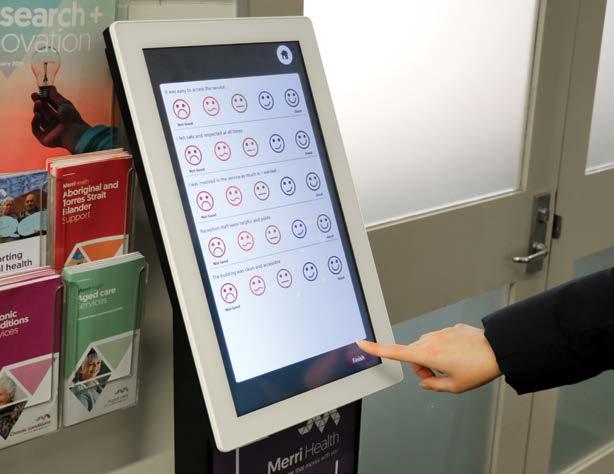
How are we tracking?
In the first four weeks of the kiosks being introduced (23 May–27 June 2019), 238 people provided feedback, with 1,188 feedback entries.
Results include:
• 92.62% of clients gave Merri Health a score of 100% satisfaction
• 7.38% provided feedback scores between 50–75% satisfaction.
Where to next?
Results will be:
• monitored quarterly by our Quality team
• shared with relevant teams to action/ address concerns.
While to date all answers are anonymous, a new option will be introduced in the 2019/20 financial period to improve options for users. This will be the inclusion of an open field at the end of the survey, where people can add comments and/or leave their contact details, if a call back is needed.
58 3. Safe and quality services | Annual and Quality of Care report 2019
Above: Our newly introduced feedback kiosks.
Case study
Dental feedback leads to a better service for children
Our Glenlyon Rd, Brunswick site is home to our dental services.
In July 2018, we received a complaint from a client about this site and their family’s experience with the dental clinic. They explained that:
• it was not set up to accommodate and support young children
• it was not child friendly
• it had no toys or the right space for children
• their child had not received a free tooth brush as part of their visit
• our clinicians did not build a connection with children.
What did we do?
In the first instance, we acknowledged and thanked the client for their feedback. From there, we reviewed our dental waiting area and clinical spaces to identify what we can do better.
This resulted in:
• the introduction of colourful stickers and posters within a dental room
• more toys added to our waiting area to provide a welcoming space
• the introduction of free toothbrushes for children accessing dental services
• our dental clinical team taking the time to build a connection with children during an appointment before moving onto dental work.

Annual and Quality of Care report 2019 | 3. Safe and quality services 59
Above: Merri Health’s Brunswick site offer dental and oral health education for children.
Dental services
Our dental service operates out of our Brunswick site at 11 Glenlyon Rd, Brunswick to deliver high quality dental services to our community.
With the support of Dental Health Services Victoria (DHSV), we are able to assess and measure how well our team is meeting the needs of the community. Our goal is to maintain high clinical standards and increase our ability, with the resources we have available, to serve the dental needs of the Moreland population.
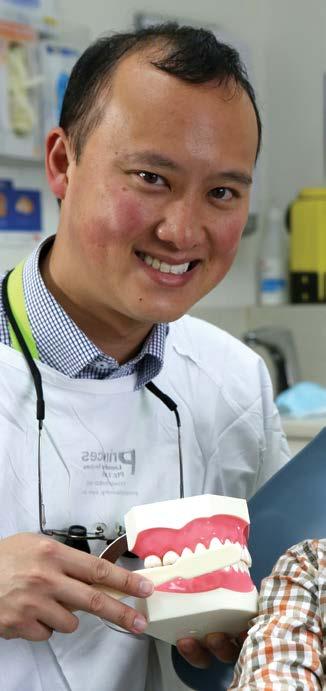
How quickly we respond to emergency care
One of our key indicators for service performance is how quickly we respond to those who need emergency care. To do this, we use a triage tool designed by DHSV that allows us to understand a patient’s needs that is classified into one of three categories: category 1 is the most urgent.
Our results show that we are very responsive in directing patients to receive the appropriate care they require.
Chair utilisation
As demand for dental support continues to grow, we do everything we can to ensure that our dental chairs are at maximum capacity and we use our resources well.
In the 2018/19 financial year, our chair utilisation dropped by 2% from the previous year. This was due to staffing changes such as people moving on to new roles or organisations. To address this, select dental staff took on more work to help meet our clinical targets for the year.
In addition, we continue to run dental services on Monday night and Saturday morning to help those that are not able to attend appointments during work hours due to other commitments, such as work or taking care of children, family or friends.
Number of priority access clients we see at Merri Health
As a community health provider, we support some of Victoria’s most vulnerable and disadvantaged people. In response to this, there are key groups that have priority access, which means they are offered the next available appointment for general dental care. This includes people that are:
• Aboriginal and/or Torres Strait Islander
• at risk of homelessness
• refugees and asylum seekers. Our data shows we have continued to support priority access with consistent results.
60 3. Safe and quality services | Annual and Quality of Care report 2019
Category 1 Financial Year Merri Health Target FY 2016/17 100% 85% FY 2017/18 95.2% 85% FY 2018/19 100% 85% Category 2 Financial Year Merri Health Target FY 2016/17 99.3% 80% FY 2017/18 99.0% 80% FY 2018/19 99.4% 80% Category 3 Financial Year Merri Health Target FY 2016/17 98.9% 75% FY 2017/18 98.7% 75% FY 2018/19 99.5% 75% Financial Year Chair utilisation FY 2016/17 92% FY 2017/18 95% FY 2018/19 93%
FY 2016/17 273 FY 2018/19 328 FY 2017/18 364 Number of priority access clients
Above: Jonathan leads our dental team at Merri.
Infection control
Our dental team pride themselves on maintaining excellent standards of infection control. We place importance on this as procedures such as extraction of teeth and root canal treatment can place patients at high risk of a post-operative infection. We want to make these procedures a comfortable experience for our patients with minimal complications. Every year we complete an infection control audit to assess our current processes with industry standard. This year, we also engaged DHSV to complete an external audit. This was a valuable experience which highlighted a few opportunities for improvement, which we have actioned. We have also completed infection control training for all staff to ensure they are up-to-date with best practice.
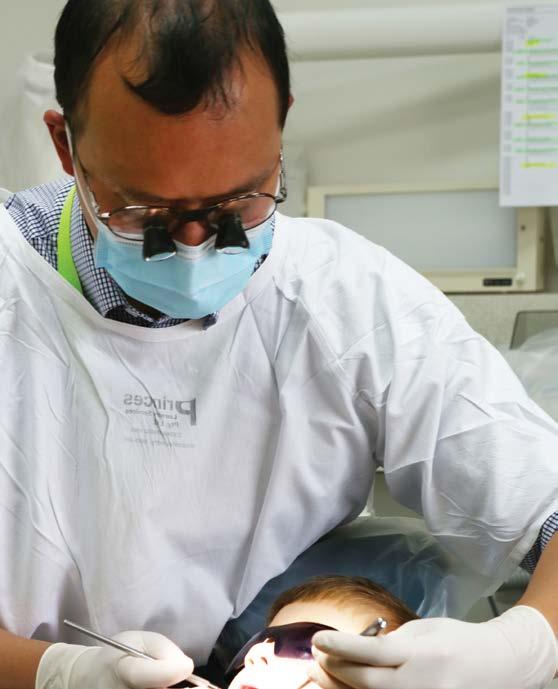
Our 2019 infection control audit received a score of 98% compliance: up from 94% in 2018. This reflects the hard work the team has done this year in continuous quality improvement.
Another method of tracking our infection control performance is our post-operative infection rate audit. This assesses our rates of post-operative infection after extractions. This year we averaged a 97% success rate in avoiding post-operative infections, which is consistent with our previous year’s performance. We will continue to monitor our performance to safeguard patients from avoidable dental infections.
We continue best practice in aseptic technique, which are clinical techniques that help reduce the risk of infection. This year we maintained 93% compliance, and have action plans for areas where there is room for improvement.
Number of people we see
Long wait lists for general dental care means there is constant pressure to meet community needs. In 2018/19, the number of people we were able to support dropped by 6%. This was due to changes in staffing which we’ve detailed under ‘chair utilisation’.
To address this, this year we were able to issue clients with vouchers to use for general dental in the private system, as a result of extra funding from DHSV. Acknowledging that this is only a shortterm solution, we continue to advocate for extra dental chairs to increase the support we can provide, so clients can access quality dental treatment when needed.
Number of people we supported
Waitlist management
This year, we were able to take a significant number of people off the general wait list due to our involvement in DHSV’s waitlist management scheme. As of 30 June 2019, there were 2,169 patients on our waitlist compared to 2,399 as of 30 June 2018. FY
Number of people removed from the wait list
Annual and Quality of Care report 2019 | 3. Safe and quality services 61
FY 2016/17 4315 FY 2018/19 3850 FY 2017/18 4097
2016/17 1533 FY 2018/19 1237 FY 2017/18 835
Above: Jonathan who leads our dental team checks a patient’s teeth.
Record keeping audit
Every year we complete a record keeping audit. DHSV collect and provide benchmarking results for this audit.
For 2018, we achieved results higher than 90%, outperforming the State average in 15 out of 24 indicators. This year we will be following DHSV’s re-audit schedule to see how we’re tracking for two categories.
Hand hygiene
Good hand hygiene keeps our clients safe. We do regular hand hygiene audits to ensure our staff understand and are completing the ‘5 moments’ of hand hygiene as outlined by Hand Hygiene Australia.
We audit our dental clinicians’ hand hygiene performance three times a year, with our last three results averaging 98% compliance — this is an excellent result.
We have also moved some auditing tools to a digital platform, which allows us to record and analyse results more easily, and benchmark our results with other community health service providers.
Infection prevention, control and cleaning Podiatry
Merri Health provides podiatry services across four sites and well as providing in-home appointments.
Every four years, our podiatry service undergoes an infection control audit which is conducted by an external independent assessor. This was completed in May 2019 and is in line with the Australian Standards, National Health and Medical Research Council guidelines, and the Australian Health Practitioner Regulation Agency guidelines. This ensures we are following the Standard, keeping good practice and keeping our clients and staff safe.
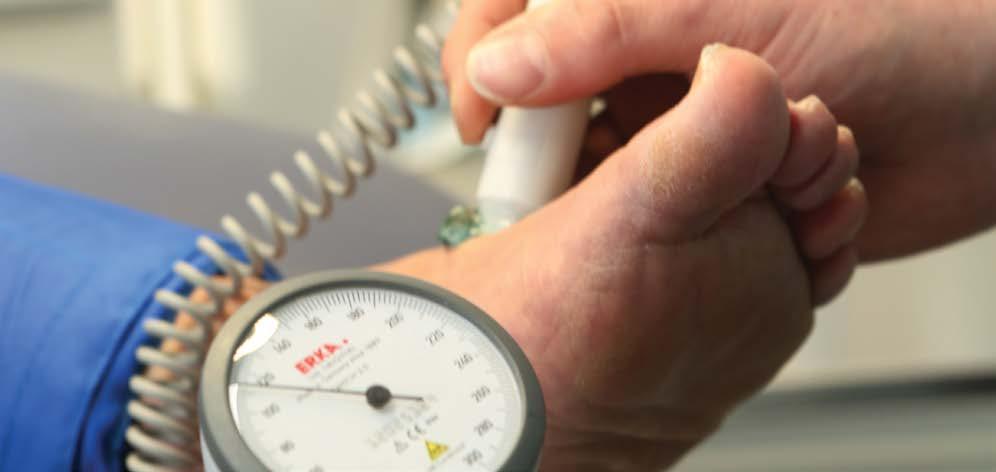
The audit highlighted that the team performed really well in using aeseptic technique and hand hygiene practices. We also identified room for improvement for the way we record our staff immunisation status.
As a result of the audit, we are working towards implementing the 12 evidencebased recommendations set in the action plan by the auditor.
62 3. Safe and quality services | Annual and Quality of Care report 2019 Number of indicators over 90% and above the State average 2016 16 25 2017 17 24 2018 15 24
Above: Podiatry services at Merri Health.
Clinical governance and accreditation status
Every three years, Merri Health takes part in a quality accreditation review, conducted by Quality Innovation Performance (QIP) and the Australian Aged Care Quality Agency. During our last accreditation reviews held in June and July 2018, and May 2019, we were awarded accreditation having met the following standards:
1. Quality Improvement Council (QIC) standards
2. Department of Human Services Standards
3. National Safety and Quality Health Service Standards (NQHS)
4. Rainbow Tick standards
5. Home Care Standards
In 2018, we were accredited for the first time under the Home Care Standards for our Commonwealth Home Support Services which include social support, allied health and linkages services,
and under the Early Childhood Early Intervention standards. Additionally, as we are an approved Home Care provider and Commonwealth Respite and Carelink service, we underwent a full accreditation review in late May 2019 by the Australian Aged Care Quality Agency.
In December 2019, Merri Health is scheduled for its full three-year accreditation assessment that will be done by QIP.
Merri Health has policies, procedures and management systems in place to enhance quality and safety, and reduce risk to clients, staff and the community. This is supported by a Quality Governance framework and associated work plan, which is supported by continuous quality improvement activities throughout the organisation’s functions. Our clinical and corporate governance systems ensure quality is monitored, reviewed and reported and is of the highest standard. Our Quality Governance policy, procedure and framework, Occupational Health and Safety framework, and Risk Management policy provide a high-level overview of our accountabilities.
Two key committees govern quality and safety at Merri Health:
• Board Quality, Safety and Clinical Governance committee oversee key strategies and higher-level reports on clinical governance, quality and risk functions
• Internal Quality Governance committees that oversee quality and risk governance at a divisional and organisational level.
What have we achieved?
In the 2018/19 financial period we:
• introduced new systems and processes to identify continuous improvement opportunities
• monitored continuous improvement activities, projects and quality indicators, including program specific work plans
• encouraged staff to share improvement opportunities with their line manager, and at monthly staff meetings
• developed a quarterly quality and safety report that is submitted to the Board, that includes:
summary and trending data on improvements, and compliments and complaints from care recipients as well as partners
service wait times
audit results
incidents/hazards.
Annual and Quality of Care report 2019 | 3. Safe and quality services 63
Improving referrals with online solutions
Access to digital solutions has allowed Merri Health to continue to improve how it does things.

Following feedback from health professionals that our referral process could be better, easier to access and streamlined, we looked to improve our online process. Currently, health professionals fax referrals to our sites using their own form; however they need to be familiar with our service offerings.
What did we do?
2018
When we refreshed our website a few years back, it was developed using a co-design process. This process sees the end user or person impacted by the change provide input into the solution. Clients were engaged and their feedback informed what the website looks like today. As a result of this, the website only met the needs of current and potential Merri clients.
To address this, via our staff we captured insights from health professionals as to what changes would make the website easier to use, without impacting on our clients’ user journey. In response we introduced a referrals section.
The referrals page outlined nine service offerings that professionals can click into to learn more about the service, who is eligible and locations. It also had a streamlined referral form for download — this means that the form looked the same for all services.
2019
Once we identified the current version was being used by professionals, we looked to simplify it even further — our goal was to maximise health professionals’ time and improve ease of use.
We updated the referrals page to minimise the number of pages professionals need to visit to get the information they need. Now, when they click in, a snapshot of all key information can be seen in the first instance, including a link to download a referral form and a contact number.
Throughout 2019/20, we will keep an eye on how this page is being used based on our website statistics, as well as feedback from professionals. This information will be used to assess if further improvements are needed.
64 3. Safe and quality services | Annual and Quality of Care report 2019
Above: Improving referrals on Merri Health’s website for health professionals.
Whole-of-sector response to elder abuse
Aged care and community workers came together in 2019 in an effort to stop elder abuse. Led by Merri Health, the Elder Abuse Prevention Network brings together 85 health and aged care organisations and councils across two networks (north and west) to address elder abuse through education, resources and campaigns.
A complex and sometimes hidden problem, elder abuse is more than just physical and can include financial, psychological, neglect or sexual abuse. The northern metropolitan Network meets quarterly and has established working groups to progress its action plan.
• Capacity building working group: supports organisations to identify and respond to suspected or incidences of elder abuse.
• Community engagement and awareness working group: raises awareness of elder abuse among community and health professionals.
The western metropolitan Network launched in December 2018.
What have we achieved?
During the 2018/19 financial period, the northern metropolitan Network:
• created a toolkit to support workers to identify signs of abuse and tools to respond including useful contacts, and a sample safety and action plan templates.
• raised awareness of World Elder Abuse Awareness Day with:
a tea dance held with the support of Moreland Council and Gerard Mansour, Commissioner for Senior Victorians, where locals aged 65+ had an opportunity to connect and learn about support available

a community awareness campaign: five case studies were developed into posters and shared on toilet doors throughout Merri to raise staff and visitor awareness — the posters have since been used externally and have potential to reach thousands of visitors attending Merri sites and other organisations
a media awareness campaign aimed at locals on how to respond to suspected elder abuse. The story appeared in the Moreland Leader which has a hard copy distribution reach of 203,000 people and digital readership of 45,000 people.
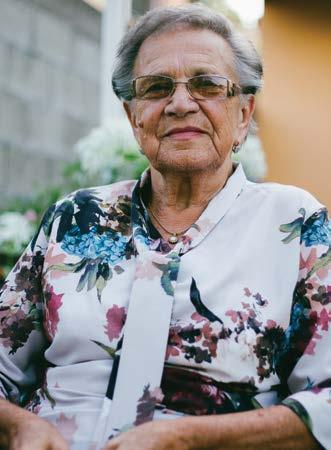
Annual and Quality of Care report 2019 | 3. Safe and quality services 65
Above: Locals enjoy our tea dance for World Elder Abuse Prevention Day.
Above: Working in partnership to keep older people safe from elder abuse.
4. Continuity and better care
How we’re supporting consumers to take control of their health and wellbeing, beyond care.
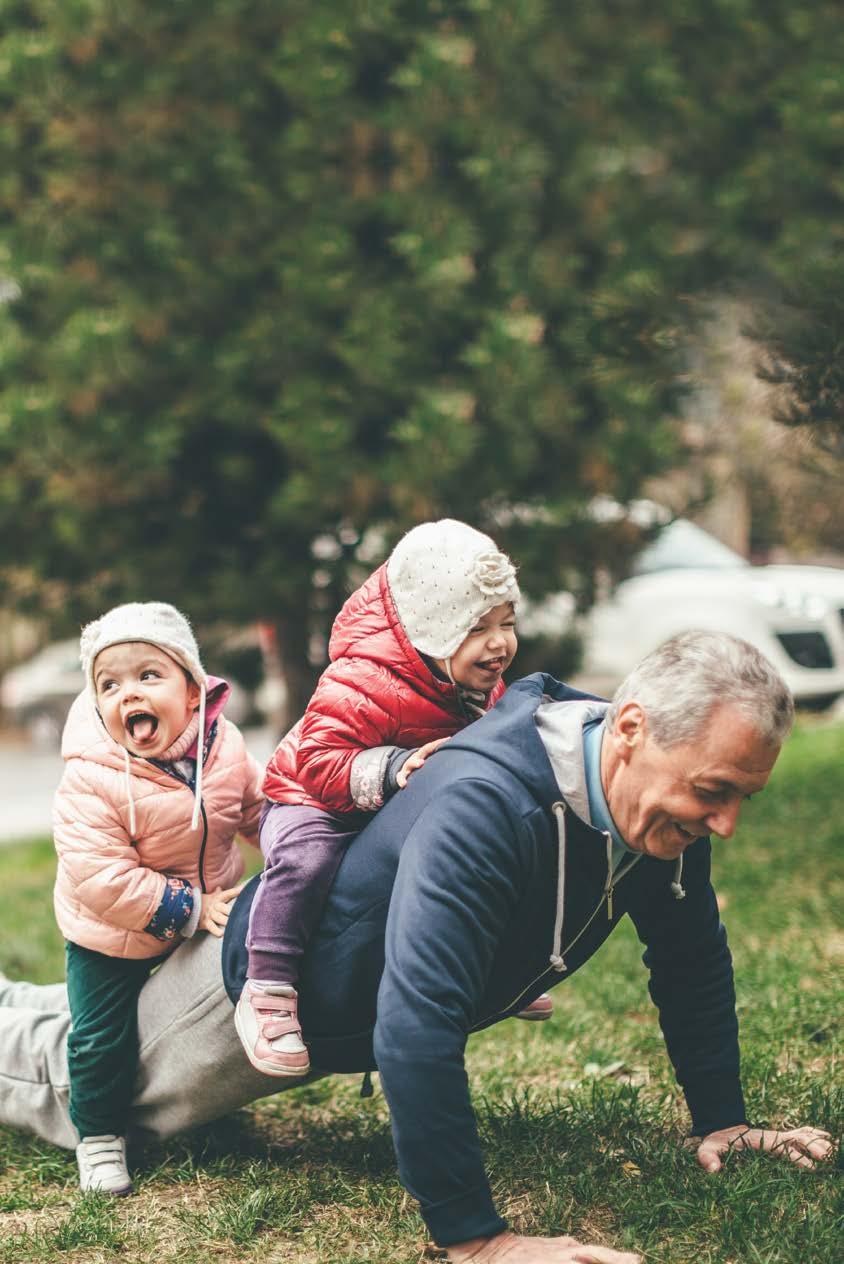
66 4. Continuity and better care | Annual and Quality of Care report 2019
Better care for children & families
How do we support children?
We prepare children and their family by engaging them in learning opportunities, to support a smoother transition into their first year of school. We also work with local schools and kindergartens to increase their communication and to build inclusive and welcoming environments.
What have we achieved?
In the 2018/19 financial period, we:
• successfully engaged and developed partnerships with:
all five primary schools and five kindergartens in Fawkner
Home Interaction Program for Parents and Youngsters
— HIPPY Moreland
Ready, Set, Prep
Preparing Fawkner families for their child’s first year at school. Ready, Set, Prep is a local initiative that prepares pre-school aged children and their families for their first year of primary school. To engage children and families, we work with community members, primary schools and early years’ providers. Based in Fawkner, these partners include all primary schools, kindergartens and early years’ services in Fawkner, as well as Moreland Council.
Why is this initiative based in Fawkner?
Census data shows a clear need for additional support for families and children in Fawkner.
Australian Early Development Census data showed that in 2018, 25.5% of Fawkner children starting school were developmentally vulnerable on one or more domains, compared to Victorian average of 19.9%. In addition, 2016 Fawkner data from Australian Bureau of Statistics found that 47.4% of the total population was born overseas and 63.2% of residents speak a language other than English at home. Of those born overseas:

• 15.3% had arrived between 2006–2010
• 23.6% had arrived from 2011 onwards.
maternal and child health services
Department of Education and Training
Fawkner service provider’s network
Melbourne City Mission
• supported 92 families, reaching more than 100 children
• connected families with other support services, having made 67 referrals
• helped influence change with all schools involved making improvements to their transition/ orientation processes for prep students
• completed a community consultation with over 100 participants to inform a video series to support Fawkner families with information on school readiness, child development, and the Australian education system. This will be completed in the 2019/20 financial period.
Annual and Quality of Care report 2019 | 4. Continuity and better care 67
Above: Getting children ready for their first year of school.
36.6%
Where to next?
In addition to extending our educational reach via our video series to be launched in late 2019, we will:
• provide a professional development day for teachers and early childhood educators on culturally responsive practice, and family engagement in July 2019
• provide small grants for kindergartens ($3000 each) to help with school readiness
• host a family information morning tea for parents of 3 year olds with key stakeholders invited to share information on school readiness, childhood development, support services, and school and kinder enrolment
• complete a research project that is being funded by our carer support program known as CarerLinks North.
First steps to better care
In its second year, our local clinic continues to grow in providing foot and leg support for children.
Merri Health’s Little Feet and Limbs clinic provides support for young children that are having foot or leg problems that affect the way they walk. We support children between 0 months and 8 years old with help from a physiotherapist and podiatrist. Reasons for support vary and include:

• children that haven’t started walking by 16 months
• concerns with foot posture such as flat feet
• falling or tripping often.
Our service works closely with local maternal and child health nurses and General Practitioners, who are the main source of referral into the service. A referral is not needed for this program so parents also self-refer. In the 2018/19 financial period, the clinic:
• received 213 referrals — this is approximately 122 more than last year
• addressed many conditions with the most common being in-toeing, knock knees and problems with walking.
Of the children assessed, approximately 50% were within the normal range and only needed one consult to support their concern.
68 4. Continuity and better care | Annual and Quality of Care report 2019
Percentage of Fawkner children starting school that were developmentally vulnerable
— Australian Early Development Census, 2015
Above: Foot and leg support for children at Merri Health.
Free support for new parents
Following demand, our Family Foundations program continues to support new parents.

A pilot project, Merri Health was the first provider selected to trial Family Foundations in Australia: an innovative approach to addressing family breakdown.
Providing free support from qualified and experienced parent coaches, the program helps new parents to adjust to life with a baby at home.
Available to anyone that is expecting or has a child under 12 months old, the program is available in Wyndham, Brimbank, Moreland and Hume and some surrounding suburbs. Over 10 sessions that are delivered in the home, the primary parent and their partner are supported with advice, education and techniques on:
• how to strengthen their communication and adjust to their new role as parents
• how to manage stress by learning practical ways to cope
• how to match their parenting to their baby’s unique temperament.
All parenting practitioners have been trained by the creator of Family Foundations, Professor Mark Feinberg from the Penn State University, United States.
To date, Family Foundations has supported 83 couples.
Gail Evans, manager of our children and family services said the service addressed stressors to avoid a break down in the family unit.
“We know that the transition to parenthood is marked by significant role changes, increased financial pressure and the high demands of infant care. These stressors can affect healthy couple relationships and put strain on an already fractured or fragile relationship.”
Merri Health is the only Government endorsed and funded organisation to pilot Family Foundations in Victoria.
166
Annual and Quality of Care report 2019 | 4. Continuity and better care 69
Above: Free support for new parents at Merri Health.
Number of new parents that have been supported by Family Foundations
Pre-loved books support child literacy
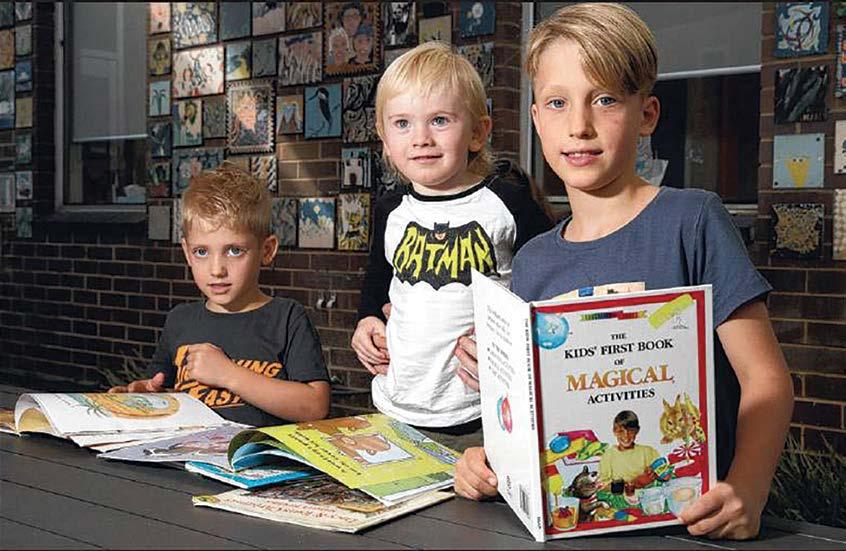
Partnering with non-for-profit Storycycle has allowed us to support child literacy locally.
Offering second-hand books at our Bell St Coburg site, children are encouraged to read a book from our Storycycle corner while they wait for their appointment, and/or take it home.
Storycycle is a not-for-profit organisation that distributes good quality, used children’s books to community organisations.
Since it was introduced in January 2019, the book corner has been refilled many times which shows the initiative is a great way to encourage children to read more books. It also offers support for disadvantaged families who may not be able to buy books to keep at home, or attend a library often.
Following the successful trial, we are reviewing the opportunity to introduce Storycycle at another site to extend its impact.
70 4. Continuity and better care | Annual and Quality of Care report 2019
Above: (From left) Campbell, Patrick and Levon featured in the Moreland Leader in April 2019 highlighting Storycycle. Photo by George Salpigtidis.
My story
Young African leader inspires change in his community.
Young leader Achmel Temple was commended for his impact as he took out a 2018 Moreland Award in the youth category. Below Achmel shares his story to show how our TRACKS program helped put him back on track.
Achmel migrated to Australia from Sierra Leonne after spending time in a refugee camp in Ghana.
“Settling into life in Australia was difficult at times mostly due to horrible memories of conflict in my home country. My family was fortunate because my mother, father and siblings where all together and we had a strong bond which helped us overcome what we had been through.”
Achmel first came to Merri Health as a participant of our TRACKS program, which supports young people with peer support to help them make better choices.
“High school was tough because I got into trouble a lot and had to work hard to get my grades up which brought a lot of pressure on me and my family.
“Towards the end of high school I started making some poor choices in regards to the company I kept and consumption of alcohol. It was a regular thing that my friends and I would go out on a Friday or Saturday night and get drunk.”
Following a devastating event in 2010, Achmel knew it was time to change.

“My best friend who was also a refugee from Africa died after being pushed into the Yarra River after drinking with friends all evening: this was the biggest wakeup call I’ve ever had in regards to having a good look at myself and where I was headed in life.
“It was not long after this that I decided to get involved with my father’s work in the community, which was running a soccer program for young African refugees. Here I found something that gave young people hope: it was inspiring and positive for other young people from Africa.”
After completing year 12, Achmel enrolled at Kangan Institute to complete a Diploma in Community Services. Through his dad’s connection in the community services sector, he was introduced to Melanye from our TRACKS program.
“Melanye provided supervision and mentoring and I quickly gained the skills and knowledge to work in TRACKS, delivering interactive and educational workshops to support other young people in secondary schools in Moreland.”
Over the course of 18 months, Achmel has made positive tracks.
“I’m now employed by TRACKS and feeling good within myself. I am now a youth support worker/mentor and feel very privileged to be able to work one-on-one with the young people.
“The TRACKS program has been a huge part of my life and really helped shape the person I am today. I really appreciate all the ongoing support and guidance from Melanye and Ross. Hopefully funding permitting, I can continue in some capacity with TRACKS in 2019.”
Achmel is currently studying youth work at Victoria University and aspires to join the Victorian Police force.
Annual and Quality of Care report 2019 | My story 71
Here I found something that gave young people hope: it was inspiring and positive for other young people from Africa.”
Education for chronic health
Asthma education to address emergency
Merri Health’s asthma education service was developed in response to high asthma rates and the unprecedented thunderstorm asthma outbreak in 2016.

With 11.4% of Victorians suffering asthma and only 21% of Australians aged over 15 years having a written asthma action plan according to Asthma Australia 2018, we identified there were opportunities to improve asthma management locally.
Since the service opened in late 2018, only five clients have reached out for support. Of those:
• one person did not attend
• one person was diagnosed with Chronic Obstructive Pulmonary Disease (COPD): a term used to describe advanced lung diseases including emphysema, chronic bronchitis, and non-reversible asthma. The person was referred to chest physical therapy that is an airway clearance technique to drain the lungs, and they were provided with COPD plan and education
• one person was diagnosed with breathlessness — they did not suffer from asthma
• two people were diagnosed with asthma and were provided asthma education and a plan to manage their condition.
Due to low engagement, we will be exploring new opportunities to promote the service to ensure as many people are able to access this much needed service.
72 4. Continuity and better care | Annual and Quality of Care report 2019
is available for
Above: Asthma education
people of
all ages at Merri Health.
Connecting and supporting carers
CarerLinks North is our carer support program. We support carers of all types in their roles and give them the flexible, individualised help they need. Support includes education, advice, respite opportunities, social connections, health and wellbeing coaching.
Carers get active!
Every year we support and encourage carers to take control of their health by joining our carer Active April challenge.
A month dedicated to putting your health first through wellbeing and exercise, our carer Active April challenge is supported by our carer Health and Wellbeing Coaching service. Carers are encouraged to take part and prioritise their wellbeing to stay in their caring role for longer.
All carers that chose to take part in the challenge were supported with an information pack by our Carer Health and Wellbeing Coaching service, which provided guidance on how to register for the challenge and track their 30 minutes of daily physical activity.
Celebrating their successes, we ended the challenge with a carer lunch that was attended by 40 carers. In addition to taking some time out for themselves, known as respite, carers were able to connect with others, share stories and learnt about our education workshops on offer.
Art therapy for dementia

Support for carers of people living with dementia.
Our dementia carer consultants provide support, education and advice for carers of a person living with dementia. We do this through individual casework and dementia education workshops and currently support more than 500 carers. Working with carers, two significant losses we’ve identified that are commonly experienced by carers of a person living with dementia include the loss of opportunities to do things together (especially for spouses), and loss of social connections with friends and extended family. As the dementia progresses, the extent of this loss gets bigger.
Identifying that there was a need to address this, we focused on the abilities of the person living with dementia and introduced art therapy sessions. Across four weeks, 16 people (eight carers and the person in their care), took part in the sessions delivered from the Heide Modern Art Museum.
One of the participant’s feedback really captured the extent of the support.
“I am more aware of the need for play… to take time out for simple activities together — things we have always enjoyed,” they said.
As this was the first time we offered this support, the first three sessions were used to take the participants through activities together, and the last session was for the carers alone, to learn more about their experience and how we can improve future sessions.
Annual and Quality of Care report 2019 | 4. Continuity and better care 73
The number of carers of a person with dementia, supported by our CarerLinks North program Number of carers that celebrated completing their Active April challenge, prioritising their health and wellbeing
500 40 Above: Carers take part in art therapy sessions.
Young carers
Young carers care for a family member, such as a parent, sibling, other relative or a friend.
After-school support for young carers
Carer needs change based on their age and experience. Young carers in particular, have different needs as they navigate their caring role with other pressures such as school and changes as they move into adulthood.
Addressing their unique needs, we have been supporting young carers for many years. Among this support, we offer a fortnightly after-school group program that runs during the schoolterm. It provides a safe space for young carers to connect and meet others with similar experiences.
In July 2018 we developed a partnership with Darebin Council’s youth service to deliver this group program from The Hub in Northland. Open to any carer aged 14–17 that looks after a parent or sibling with a mental health issue, disability or chronic illness, we had 30 young carers participate. In addition to connecting and doing fun activities, they learnt to prepare a meal further developing their life skills.
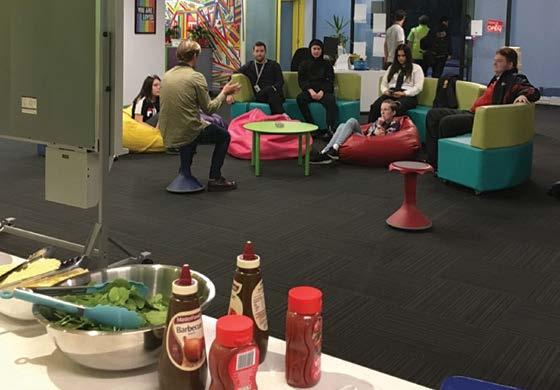
As demand for this program gets bigger, we’ve been exploring the opportunity to offer this support from many sites, so that it’s closer to home for carers. In early 2019 we started conversations with Hume Council’s youth services to recreate this in their area, and started a second group from Youth Central in Broadmeadows.
we connected young carers in 2018/19
How
• 2 camps
• 1 outing to Kemizo Entertainment Centre to take part in ice skating, rollerblading and rock climbing
• 1 laser tag session
• 1 outing for carers and their family at Latitude
• 1 young carers event during Carers’ Week
74 4. Continuity and better care | Annual and Quality of Care report 2019
Above: Young carer engagement session at The Hub.
Pilot project trials school-based support
At Merri Health, we offer services for every age and stage of life, and many times, work across programs to better support client needs.
Identifying a need for support in school for young carers, our carer support program CarerLinks North partnered with our youth education team known as the School Focused Youth Service to pilot a new project. Based at a Moreland school and endorsed by the Department of Education, the pilot offered support in a school-based environment.
A group of carers participated in eight sessions that focused on the needs and responsibilities of young carers. They also connected with other young carers that they may not have known about previously, and were offered a safe space to talk about their experiences at school.

What were the findings?
Following the sessions, feedback from students found they:
• were more aware of where to seek help with issues relating to their caring role
• better understood the importance of self-care
• felt more connected with other young carers, with a sense of shared community.
Annual and Quality of Care report 2019 | 4. Continuity and better care 75
Above: Peer volunteer group at a local school.
Carers lend a hand for extra support
Every carers experience is unique. Being able to connect with other carers is helpful as they are able to share experiences and provide support to each other. In response, we connect carers via our peer support service.
Supporting carers to run their own group, we offer a Meet and Greet session over morning tea where carers can choose to join an existing group or create a new one based on shared interests or geographical locations. This year, we’ve supported many carers with outings to Trentham Falls, Monstalvat, Marnong Estate and the Melbourne Aquarium.
Key to this service are our volunteer peer leader roles. In the 2018/19 financial period, we have had an increase in the number of carers that have taken up this role. They meet quarterly and share their insights and experiences in leading groups.
Throughout 2018/19, our volunteer peer leaders have led the following groups:
• Walk and Talk (north east) carer support group: rain, hail or shine, this fortnightly group venture along the Darebin creek trail in an effort to support a healthy body and mind. Due to demand for this support in other geographical areas, we introduced a second group in the north-west that meet at our Glenroy site and walk along the Northern Golf course

• Dementia carers’ support group (north east and north west): two monthly ongoing dementia peer support groups held in Broadmeadows and Yarrambat, offering carers emotional and educational support
• Carer’s singing group: known as the Carers’ Chorus, the group is now in its second year and meet fortnightly after hours, to accommodate working carers. No singing skills are needed, instead it’s an opportunity for carers to connect while taking part in a fun activity
• Carers’ lunch support group: a monthly catch-up over lunch across the northern metropolitan area, to share stories, coping strategies and provide emotional and social support
• Carers movie and coffee support group: a monthly catch-up in the Yarra area for carers supporting someone with a mental health condition. Due to demand from carers in other regions and its success, we have introduced this group in Craigieburn and Mill Park
• Cragieburn Aged and Retirement Village carers: monthly meeting for carers going through a transition to aged or retirement living with the person in their care
• Evening support group: supporting working carers, this after-hours group catch-up socially over dinner
• Parent carer support group: monthly meetings for parents of children with autism and/or a disability
• Art and interior design: monthly sessions that supports carers in a creative environment. The group is led by a carer that is qualified in interior design and offers educational opportunities about art and design.
Taking services on the road
76 4. Continuity and better care | Annual and Quality of Care report 2019
We now offer outreach carer support services to clients of cohealth in the City of Yarra. Weekly services include counselling, and health and wellbeing coaching.
Above: Carer outing at Trentham Falls.
My story
Angelina
Angelina Angelica is a carer who has been receiving support via our CarerLinks North program for a few years. In the hope of supporting other carers, Angelina shared her story as part of Moreland Council’s Humans of Moreland online campaign. This is her story.
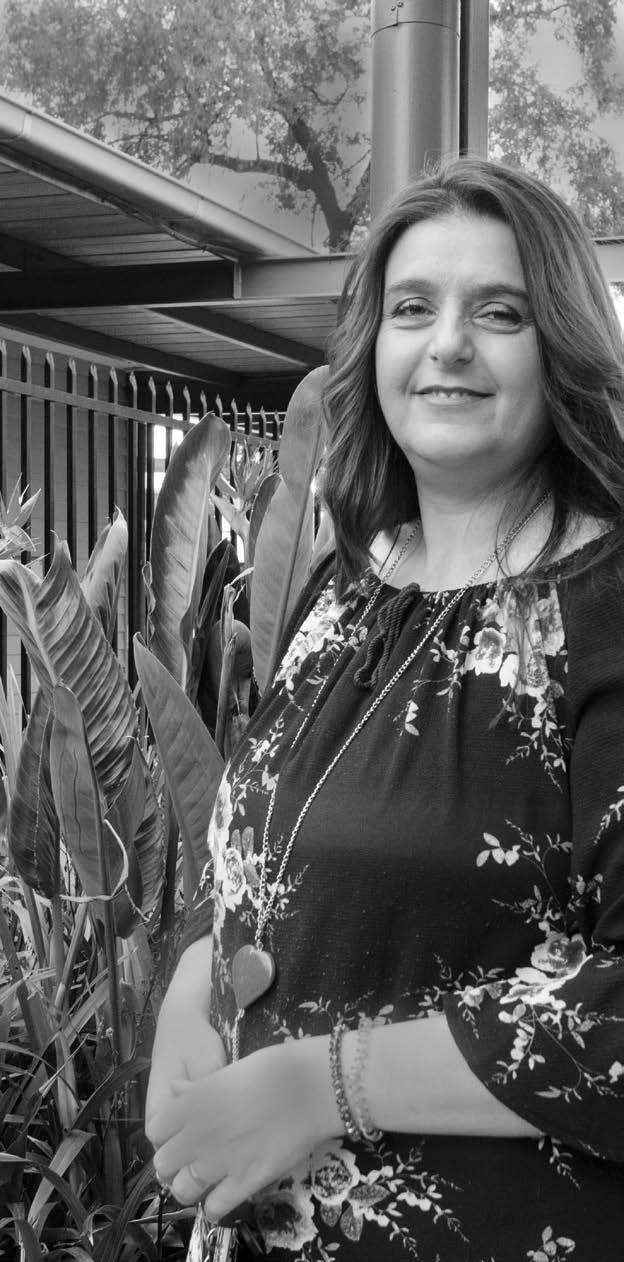
Angelina Angelica works as a parent liaison officer for Coburg Special Developmental School, where her 14-yearold daughter Marium is also a student.
As a carer for Marium, her 87-year-old mum and 88-year-old uncle who both live alone, her husband and her daughter Julianna, Angelina knows the importance of support when you’re in a carer’s role.
“There’s nothing worse than not knowing where to go,” she says.
“At first I was overwhelmed, a fish in a big ocean.”
After linking in with CarerLinks North, Angelina felt more supported. She is now also dedicated to helping others in a similar situation.
“It’s important to have a community that understands because being a carer can be hard.
“If I win Tattslotto I’ll open up an aged care centre for people with special needs,” Angelina said.
“I just want people to be able to share info — that’s my end goal. To feel connected. There’s light at the end of the tunnel.”
Annual and Quality of Care report 2019 | My story 77
It’s important to have a community that understands because being a carer can be hard.”
Left: Angelina Angelica.
you know
Victorian Carers Recognition Act
Our CarerLinks North program is guided by the Victorian Carers Recognition Act 2012. Every year, we share how we’re meeting the Act in supporting carers in their caring role.
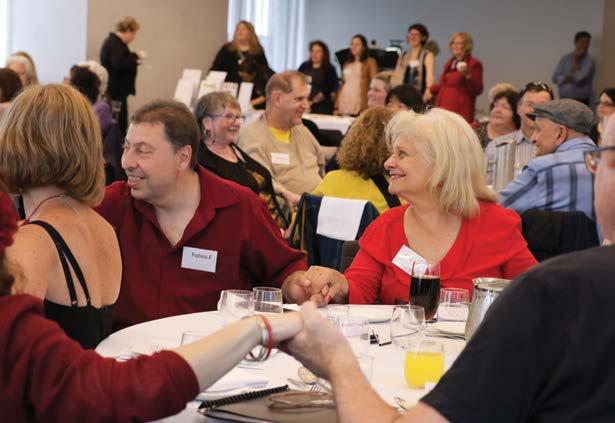
About the Act
The Victorian Carers Recognition Act 2012 promotes and values the role of people in care relationships, and formally recognises the contribution that carers and people in care relationships make to the social and economic fabric of the Victorian community.
How we meet the Act
Merri Health promoted the principles of the Act to people in care relationships who receive our services, and to the wider community by:
• distributing printed material about the Act at community events or service points
• providing links to State government resource materials on our Facebook channel, given that engagement on this platform is by our clients and community
• providing digital and/or printed information about the Act to our partner organisations.
In addition, it’s important that our staff are aware of their obligations under the Act, and understand care relationship principles. We do this by:
• developing and implementing a staff awareness strategy about the Act’s principles and what they mean
• providing induction and training programs for staff throughout the year.
When developing and updating organisational policy and procedures, we take all practicable measures to consider the carer relationships principles. In the 2018/19 financial period we:
• reviewed our employment policies, such as flexible working arrangements and leave to ensure that they comply
• developed a satisfaction survey which is completed at assessment and review meetings between workers, carers and those receiving care.
78 4. Continuity and better care | Annual and Quality of Care report 2019
* Name has been changed to respect the privacy of our clients. Stories and quotes have been included with the permission of the client.
Did
we have a CarerLinks North evaluation framework?
Introduced
in 2019, it details our process for collecting and analysing information and data before and after service delivery, events and activities. This ensures our process is consistent for better outcomes.
Above: Carers at our 2018 Carers’ Week celebration.
Celebrating carers
National Carers Week 2018 was held from the 14–20 October 2018 under the theme ‘Why We Care’. Carers’ Week is an important date for our CarerLinks North team, as it’s an opportunity to celebrate carers and the contribution they make to the Australian community.
In 2018/19 financial period we held three events during Carers’ Week. They were:
1. Carers’ lunch held at Marnong Estate on Wednesday 17 October
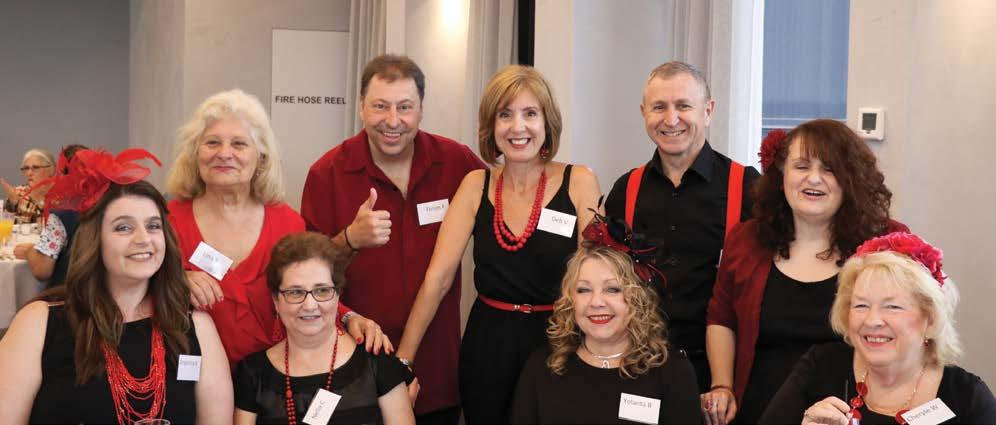
2. Koorie Carers’ Lunch on Thursday 15 November for Aboriginal and Torres Strait Islander carers — read more about this on page 31
3. Young carers family event held in partnership with Little Dreamers Australia at St Kilda’s Luna Park on Friday 19 October. A total of 387 carers and family members attended across the three events, with:
• 101 carers attending the Carers’ week lunch
• 56 carers attending the Koori carers’ lunch
• 70 families (approximately 230 people) attending the young carers’ family event.
When planning for carers’ week events, we use a co-design process. This means we work and plan these events in partnership with our carers to ensure the events are right for their needs, and are of interest. Four carers participated in the Carers’ Week working group.
At the end of each session, we collect feedback from carers to see what they enjoyed and what we could do different or better next year.
“Thank you for running this event; it was greatly appreciated by all the family!” said Patricia*, a local parent.
“The children were asking lots of questions about the event, if it would run again, how often young carers do something like this and if we would be able to go again. They absolutely loved it!”
Annual and Quality of Care report 2019 | 4. Continuity and better care 79
Above: Members of the Carer Chorus that performed at the 2018 Carers’ Week event.
Free education workshops for carers
Responding to the unique needs of carers is important to us. While we provide many opportunities for social connections, based on feedback we know that carers value learning something new that they can apply to their caring role. With this in mind, we launched free workshops for carers.

Delivered in an inclusive and sharing environment, carers can choose from 10 workshops on topics such as how to find information, supports and services, planning for the future, keeping healthy and active and exploring ways to get back into the workforce.
Throughout 2018/19, we delivered 26 workshops with participation from approximately 127 carers.
Looking forward, we will be evaluating the sessions and feedback from carers in late 2019 to plan for the future.
80 4. Continuity and better care | Annual and Quality of Care report 2019
Supporting healthy ageing
At Merri Health, we support healthy ageing by supporting choice, connections and independence for anyone aged 65 years and over.
Social groups for healthy ageing

Our social groups have been around for many years and continue to be a popular option for older people looking to stay connected with others while doing fun and enjoyable activities.
Officially known as Social Support Programs, we offer a range of activities from our Moreland Rd Brunswick West and Cromwell St Glenroy sites, such as Italian speaking groups, memory groups for people with dementia, a gardening group, single gender groups, coffee catch-ups and walking groups.
What have we achieved?
In the 2018/19 financial period we supported 436 older people to take part in social groups. Key achievements included:
• celebrating Valentine’s Day and the FIFA World Cup with in-house activities to ensure they didn’t miss out on the fun
• evening dinner sessions to promote opportunities to participate in the community
• forming a ‘flash mob’ made up of participants of the group. The ‘mob’ has performed at many community events including our Be Merri festival!
436
The number of people we supported with aged specialist services
Annual and Quality of Care report 2019 | 4. Continuity and better care 81
Above: Participants at our Social Support Programs.
Support to keep you moving
As we age, our bodies change which can affect our ability to do things. Our Rapid Reablement program was introduced in 2018 in response to this. It supports older people to return to doing the things they enjoy the most, and stay living independently in their home for longer.

Focusing on goal-based therapy, we offer short-term health services that are right for the person’s needs. This may include physiotherapy, occupational therapy, exercise physiology and speech pathology. We can also offer extra support from other allied health services within Merri Health.
This service is offered in collaboration with local Regional Assessment Services and we have strong links with other Merri teams and services, such as the Independent Living team and aged specialist services. This means we can draw on further specialist knowledge to offer the right support.
What have we achieved?
In the 2018/19 financial period, we supported 287 clients to access this support, promoting greater independence, mobility and autonomy.
82 4. Continuity and better care | Annual and Quality of Care report 2019
Above: Participant takes part in one of our exercise sessions for older people.
Memory and dementia support
Merri Health’s newly introduced memory and dementia service helps older people through memory changes. We work with the person impacted by the changes to help them understand what they’re experiencing, and how to stay independent.

Providing holistic in-home support, clients can access occupational therapy, physiotherapy, exercise physiology, speech pathology and dietetics, in addition to a bulk-billed geriatrician, and dementia carer consultants.
What have we achieved?
In the 2018/19 financial year, the service has engaged and supported 139 people with memory and dementia conditions.
Dementia is a condition that affects the brain. It impacts thinking, behaviour and the ability to do everyday tasks.
Dementia can happen to anyone but is more common in people 65 years and over.
In 2018, aged services staff took part in Enabling EDIE™, an immersive workshop where you see the world through the eyes of a person living with dementia.
Annual and Quality of Care report 2019 | 4. Continuity and better care 83
Above: We support older people through memory changes.

84 About Merri Health | Annual and Quality of Care report 2019
Board of Directors proceedings Financial report

Annual and Quality of Care report 2019 | About Merri Health 85
Board of Directors proceedings
86 About Merri Health | Annual and Quality of Care report 2019 Board attendance at meetings 2018/2019 Director Eligible to attend Attended Carlo Carli — Chair 11 10 Darryl Annett 11 8 Julie McCormack 11 11 Marleine Raffoul 11 11 Michael Beahan 4 4 Michael Malakonas 11 10 Katerina Angelopoulos 11 11 Joe Caputo 11 10 Benjamin Maxfield 11 11 Ann Taylor 7 6 Board engagement at sub-committees 2018/2019 Finance Audit and Risk Management Director Potential Attended Michael Malakonas — Chair 6 6 Darryl Annett 3 3 Benjamin Maxfield 6 6 Marleine Raffoul 3 3 Carlo Carli 6 4 Quality, Safety and Clinical Governance Director Potential Attended Julie McCormack — Chair 6 6 Katerina Angelopoulos 6 6 Joe Caputo 3 2 Carlo Carli 3 1 Ann Taylor* - 2 *observer
Community Engagement Director Potential Attended Marleine Raffoul — Chair 2018 2 2 Joe Caputo 2 1 Michael Beahan 2 1 Darryl Annett — Chair 2019 3 3 Ann Taylor 3 3
Community representation on Board
About sub-committees
Finance, audit and risk management
This sub-committee oversees financial performance, compliance, risk management and internal and external audits for Merri Health. The sub-committee meet six times a year (or more frequently if required) and is made up of at least two Board members, at least one community member with financial expertise and members of the Merri Health executive team.
Clinical governance
This sub-committee meet quarterly (or more frequently if required) to oversee key strategies and higher level reports on clinical governance functions. The sub-committee is made up of at least two Board members, up to three community representatives with clinical expertise and members of the Merri Health executive team.
Community engagement
This sub-committee meet quarterly (or more frequently if required), with the purpose to consult with community representatives on activities and services of Merri Health. The sub-committee make recommendations to the Board about how to engage with the community and obtain meaningful feedback and potential improvements. The sub-committee is made up of at least two Board members, a minimum of four community representatives and members of the Merri Health executive team. We are grateful for the support we receive in kind from community representatives on our Board sub-committees.
Annual and Quality of Care report 2019 | About Merri Health 87
sub-committees 2018/2019 Finance Audit and Risk Management Representative Potential Attended Geraldine Allen 6 5 Community Engagement Representative Potential Attended Giuseppe Ardica 5 2 Sanjay Gund 5 1 Mairi Rowan 5 5 Mustafa Kouklan 5 2 George Jiang 5 0 Susy Pinchen 5 4 Adua Rosso 5 5 Fareed Ayub 4 3 Deb Dean* -*resigned Clinical Governance Representative Potential Attended Sheena Watt 6 3 Simone Pike 4 3 Celine Johns 4 3 Roxanne Adams 3 2
Financial statements
The following forms the Concise Financial Report for Merri Health and are extracted from the Audited Financial Report. The Concise Financial Report cannot be expected to display a full understanding of the financial performance, financial position and financing and investing activities of Merri Health. A full copy of the Audited Financial Report is available at merrihealth.org.au.
Statement of comprehensive income for the year ended 30 June 2019
Statement of financial position
88 About Merri Health | Annual and Quality of Care report 2019
2019 $’000 2018 $’000 Revenue Revenue from operations 37,944 34,342 Other revenues 1,663 2,431 Total revenues 39,607 36,773 Expenses Employee benefits expense 25,974 24,220 Depreciation and amortisation 1,240 1,175 Finance costs 120 114 Supplies 266 234 Computer expenses 485 528 Consulting and legal costs 259 249 Client costs 4,782 4,199 Communication 335 327 Motor vehicle expenses 314 327 Occupancy costs 1,511 1,223 Payments to other agencies 1,884 1,794 Repairs and maintenance 188 226 Employment expenses 509 503 Loss on disposal of pp&e 6 283 Other expenses 1,269 1,102 Total expenses 39,142 36,504 Total operating surplus for the year 465 269 Revaluation of property (422) 24 Total comprehensive income for the year 43 293
as at 30 June 2019 2019 $’000 2018 $’000 Current assets Cash and cash equivalents 14,127 13,453 Trade and other receivables 1,274 733 Other current assets 2,683 2,335 Total current assets 18,084 16,521 Non-current assets Property, plant and equipment 12,412 13,332 Total non-current assets 12,412 13,332 Current liabilities Trade and other payables 7,836 7,920 Provisions 3,568 3,030 Total current liabilities 11,404 10,950 Non-current liabilities Provisions 1,062 916 Borrowings 2,853 2,853 Total non-current liabilities 3,915 3,769 NET ASSETS 15,177 15,134 Equity Reserves 2,236 2,658 Retained earnings 12,941 12,476 TOTAL EQUITY 15,177 15,134

Annual and Quality of Care report 2019 | About Merri Health 89
Above: The team at our Brunswick West site supporting people 65 and over.
Contact us
Our sites
Brunswick
11 Glenlyon Road
Brunswick VIC 3056
Brunswick West
382–386 Moreland Road
Brunswick West VIC 3055
Coburg
93 Bell Street
Coburg VIC 3058
Coburg
Ground floor, Unit 4
19 Pentridge Boulevard
Coburg VIC 3058
Coburg
21 Victoria Street
Coburg VIC 3058
Fawkner
79 Jukes Road
Fawkner VIC 3060
Glenroy
5D Cromwell Street
Glenroy VIC 3046
Preston
Level 2, 110 Chifley Drive
Preston VIC 3072
Preston
Ground floor, Suites 3–4
306–308 Bell Street
Preston VIC 3072
Wangaratta
Level 3, 62–68 Ovens Street
Wangaratta VIC 3677
t: 1300 362 739
Connect with us
Merri-Health
@MerriHealth
goo.gl/gWrGqi
Merri Health
Your feedback is important to us
Your feedback is important to us. It’s good to give feedback as it helps us improve how we do things. We manage all feedback as quickly as possible and it is confidential.
You can provide feedback by:
> (03) 9389 2234
> quality@merrihealth.org.au
> merrihealth.org.au
All services
> 1300 637 744
> info@merrihealth.org.au
National Disability Insurance Scheme
> 1300 637 744
> ndis@merrihealth.org.au
Carer support
03 9495 2500
Victims Assistance Program
1300 362 739
My Aged Care*
1800 200 422
*My Aged Care is the first point of contact for aged care services
merrihealth.org.au
90 About Merri Health | Annual and Quality of Care report 2019
Annual and Quality of Care report 2019 | About Merri Health 91
92 About Merri Health | Annual and Quality of Care report 2019





































































































